#THANK YOU FOR READING THIS LONG POST
Explore tagged Tumblr posts
Text
An incomplete list of TMA fics I adore
-beacuse of this ask
(If you liked the fics I previously recommended/made fanart for, I think you'll gonna like these as well, but you know, read the tags, know what you are going into)
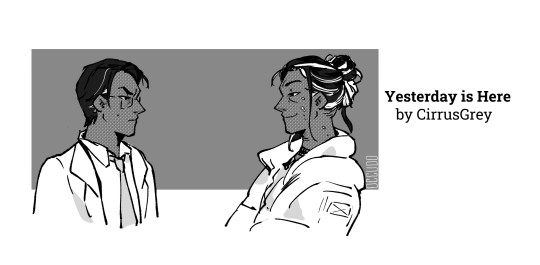
Yesterday is Here by CirrusGrey @cirrus-grey
Time Travel Fix-it! Slow burn! So good! So much sass from future!Jon- I doubt I have to introduce anyone this amazing author, but if you somehow missed them till now, this is your time! I highly recommend all of their other fics as well, for example one of a more recent one, The Stranger I Know Best is also a lovely read.

enthralling by Prim_the_Amazing @primtheamazing
Vampire!Martin!! I have no words of how much I love this concept, this story, everything about this. I think I'm going to repeat myself through this list, but I also recommend everything else they've written!
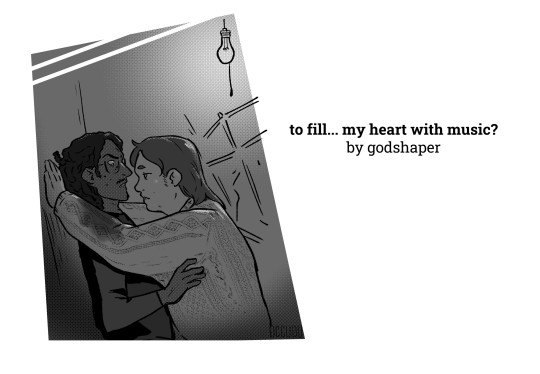
to fill... my heart with music? by godshaper @godshaper so their Martin and Jon design are different from mine, also they made a way better art for this- but still, I wanted to include this really good fic in this list.

Do It All Anew by inkfingers_mcgee or @crit20art
You know the feeling when you read a book that makes you cry, and after that you recommend it to your friend? Well- there is no reason I mentioned this, I'm just so normal about this fic. Or any other fic from inkfingers_mcgee... like Strange Manner of what I made another fanart way back. Also, check out their art!
Anyway, here is Aamal- she is not going to cause emotional damage.
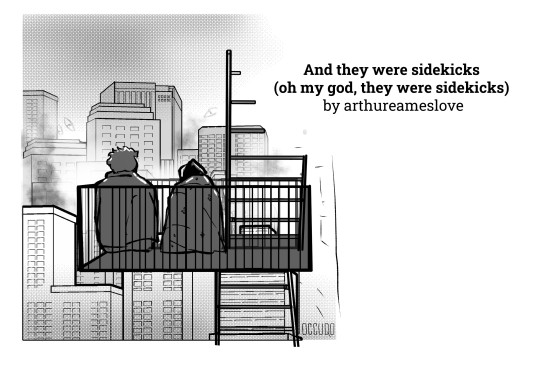
And they were sidekicks (oh my god, they were sidekicks) by arthureameslove @arthureameslove
A lighthearted series where Jon and Martin are sidekicks of supervillains- it's just a really fun fic, also recommend everyting from this author - I previously draw fanart here for an other fic of theirs Like a Lighthouse, Call Me Home
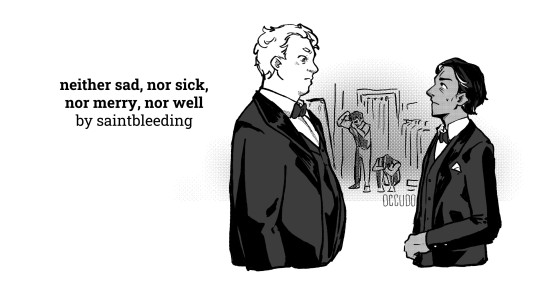
neither sad, nor sick, nor merry, nor well by saintbleeding @saintbleeding
To quote the aurthour: "Post-divorce Jon and Martin in a wedding-based romcom" It's such a comfort read, also has a Tim/Sasha wedding, and lots of cameos! I realised most of these authors I made fanarts for before- like this one for some kind of miraculous bind, this one is oneshot and a bit more serious in tone.
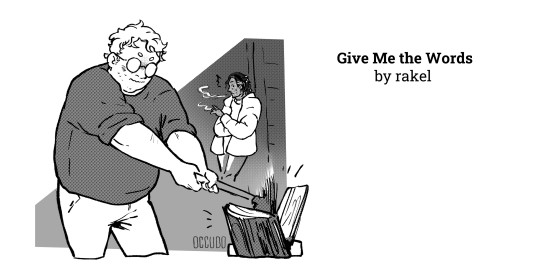
Give Me the Words by rakel @rakel-on-ao3
"Jon and Martin try to make the most of a bad situation in the Scottish Highlands. The situation is worse than they realised." You know that one post about wanting to write PWP, but it keeps turning into character study? Well, this one comes to my mind each time I see that.

i wanna find a home (i wanna share it with you) by heartshapedguy @transgenderboobs
So what would have happened if instead of the cot (tm), Jon offered Martin his own flat to stay? There is no way it's going to change their relationship, right? Such a good read, if you want some fluff, I highly recommend it!
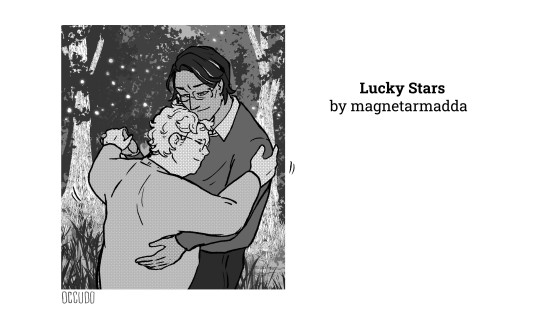
Lucky Stars by magnetarmadda @magnetarmadda
Martin has a lovely family (except his mother) but still, he needs a fake boyfriend, and Jon comes to the rescue. It's one of the first fics I remember reading after I finished the series. It is such a comfort read of mine~
(+enjoy a rare tall Jon from me)
There are so many more fics that also deserve the spotlight, these are just the ones I read multiple times and/or didn't made fanarts for before. If you find something here you like, give them some love! Kudos and comments! They deserve it. (Also, just an extra disclamier some of these are PWP or rated T- just mind the tags)
I tried to link and tag everything, I hope it works.
#occudo's art#tma fanart#jonathan sims#martin blackwood#fic rec#so many fic!#thanks for every author who made all of these#and sorry if I forgot to include someone#I tried my best#but sometimes my goldfish memory wins#anyway#good reading!#if you find something here you like give them some love#comments and kudos#long post
3K notes
·
View notes
Text

i listen to fog lake too much
#falls through the ceiling with a mighty crash hello#it's been what...8 months?#I was too busy w uni and being mentally ill#thank u everyone so much for the tags on all prev posts.. i re-read them oaccasionally 💗#they make me v happy thank u for giving me a moment of ur time#that means so much#anyway! vashwood!!#i hate them so much#i want to eat them#i want to ugly cry#i want an ideal world where they could've had something for a little bit#im eating drywall and pacing around the room in a cold sweat#so trimax-atypical overt intimacy it is#more coming...in maybe another year#It's a big project!#to me. yeah#my dream is to be put in a terrarium for a while#if only u knew how many wips I have w vashwood..#maybe i'll get tired and pile them into one post all unfinished and no less ok for it yk#whatever u r doing doesn't need to be perfect to make someone happy#didn't u experience a positive little zap from my imperfect colored doodle rn?#what a speedrun of a drawing that was#(<spent 10h on it. that's the minimum for anything ever)#hope today is treating you well! so long stranger!#vashwood#vash the stampede#nicholas d wolfwood#trimax#trigun#tzarrz
3K notes
·
View notes
Note
Holy shit I love your Dirk interpretations, it's so true and I could talk about this shit forever. I feel like another part of his character that people seem to forget (along with Roxy for some reason) is that he's from the future in solitude in an apocalyptic wasteland. I just see that part of his character always removed which is disappointing because I feel like that's a pretty big part, especially regarding his themes around technology, his brother's theme of Time, his own isolation, and how he plays in the vastness of the universe and spacetime.

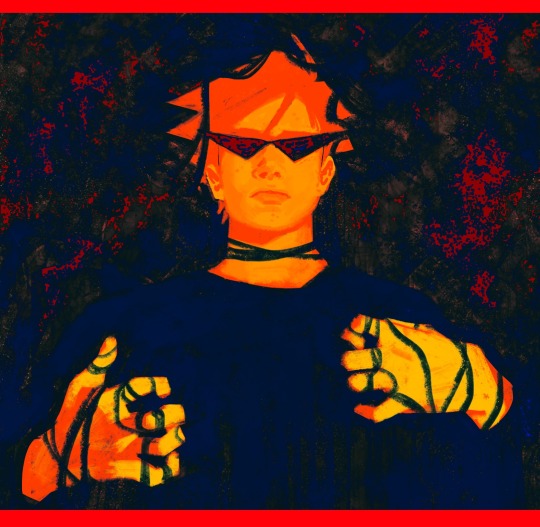
Art I drew related to the subject because I like to respond to asks with art.
But absolutely. I certainly understand where the lack of discussion over his isolation + upbringing comes from, considering a majority of the fanbase that I have seen builds their ideas based on their own version of postcanon. I’m not entirely sure how that would be fixed, but certainly even in the somewhat recent past I would see a lot more content regarding his upbringing both literally and symbolically. I don’t have much to add regarding the things you’ve mentioned, because they just are what they are. Dirk being confined to a singular room left to him by a father figure he never met, in a future where the only other person left on the planet is someone he cannot pursue a relationship of because of himself, with purely 3 robots to keep him companion, one being an exact replica of his own brain who is *also* trapped inside a pair of glasses, is about as literal as it gets to me.
The contrast to me involving the flooded, organic world in comparison to the little speckle of Dirk’s apartment packed with the dude and his technics is not only a representation of his isolation and entrapment within himself, but also of his lack of control. I think his obsession with & themes of control are a direct product in the case of Dirk specifically *of* this kind of upbringing. His themes of technology are also related to his themes around control. So much of his character is actually revolved around this to me like so much. Dirk is so deeply disconnected from humanity in every way and so much of his character + symbolism is based around that.
It doesn’t even have to be about the symbolism or anything though. It’s just pretty *interesting* in the literal sense that he lives in the middle of the ocean in the future. There’s not only a lot to theorise on to do with his young life there, but on how it might affect him in the way he acts for the rest of his life. The latter part is probably what I see mentioned the most by people talking about Dirk regarding this, I’m surprised I don’t see more discussion on the former too though. I really ought to actually talk more about Homestuck stuff on here. I will do it myself.
Roxy & Dirk’s relationship is largely ignored though because there is a narrative a certain demographic spreads that Dirk resented and blamed Roxy for her interest in him, and thus too many people believe that their relationship was or would continue to be an abusive one. Realistically, I believe it’s important to acknowledge that the way Roxy treated Dirk regarding his homosexuality wasn’t right while still acknowledging the obvious amount of respect and admiration Dirk had for Roxy. I mean we have a huge piece of dialogue from their post trickster mode conversations on the quest beds from Dirk purely stating how he feels about Roxy that people completely ignore somehow. I think this usually happens to characters that are women though. I know everyone says it, but it is true. Jane gets the exact same treatment of boiling her down to solely her negative aspects. The things I see completely mischaracterising both of them are horrific.



I mean how much more explicit can it get that their relationship is obviously very important to Dirk? But I digress. I think the best or I should say “most interesting” interpretations of their relationship usually come from DirkRoxy shippers actually.
I would be interested to hear about Dirk’s relation to his brother’s theme of time though. I don’t have any thoughts on this and I don’t recall ever hearing anyone talk about it before. If you or anyone else would be willing to enlighten me I’d be thrilled.
#homestuck#homestuck fanart#hs fanart#dirk strider#blooby posting#ask#Sorry for taking so long to reply to you on this. I’ve been in more of a drawing than a speaking mood lately#which is very unusual for me. This is definitely not as much of a post as it could be but I’m still not back on my thought and speech game#I know the Roxy mention was in brackets but good lord the treatment Roxy gets from fanbase is insane. Couldn’t help myself#Sorry if anything is worded badly. I’m tired per usual#I think (with no malice in my heart) people just tend to leave out what they don’t like about characters though.#I was very briefly talking with Pomme johnegbertirl#and it got me thinking about how far a lot of people’s interpretations of characters stray from what would be realistic to canon#based on their own biases. Which I guess I probably do too to a certain degree.#I’m not one to judge people for their characterisations at all#I tend to be very forgiving when it comes to reads#but… I admit that is indeed a little disappointing to see how completely ignored some parts of his characters are.#Sorry for tangent that is tenuously related. It is relevant enough to shove haphazardly into tags#I’m glad you like my Dirk ramblings though. Thanks brother#We live on
888 notes
·
View notes
Note
spare some spy hcs? 👀


OKAY. ok. so i have been putting off answering this ask because i’m admittedly very shy and very afraid of sharing my headcanons. and also because i have A LOT OF THEM.. but here we are!
here are my headcanon spies :) René works for RED and Jacques works for BLU!
where to start, where to start… i have a LOT of headcanons for them, i’ll be talking for FOREVER here. i’ll just start with story because why not! xP
René’s parents were also agents/spies, so he was always destined to be one as well. And he lives up to his parents’ legacies! He’s most notorious for destroying gangs and mobs and the like from the outside in. He was brought to America years ago to take out a dangerous mob boss, but unfortunately found himself infatuated (and involved) with the boss’ daughter. Luckily for him, the boss’ daughter wanted the guy dead, too.
René’s story is honestly a lot more fleshed out than Jacques’, but here goes anyway:
Jacques’ father was a very rich and powerful man in politics. Jacques himself was the result of an affair, and to keep it hush-hush, his father decided to raise him. Raise is a strong word, though— but he did help his father gain intelligence and blackmail on opposing political parties. Jacques proved to be a promising spy since childhood.
If anyone has any suggestions/ideas for Jacques’ story, let me know haha x) he didn’t have the greatest upbringing per se…
last thing on this section i wanna talk about is the Scouts. René is related to both of the Scouts; he’s RED Scout (Jeremy)’s biological father, and he’s BLU Scout (James)’ adoptive/step-father. Jacques has no relation to either scout, but acts as a guardian figure to BLU Scout.
anyway, this is the part where i continue talking about other miscellaneous headcanons! and these come with doodles :)
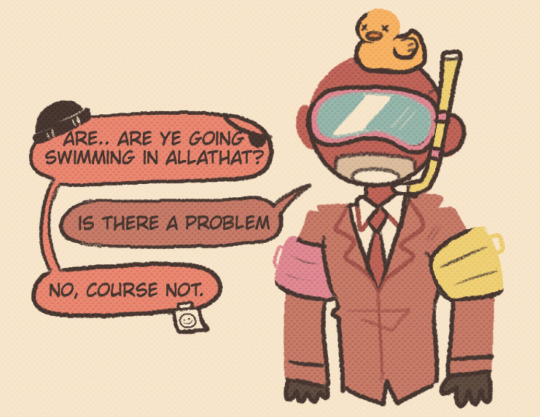

You couldn’t catch René DEAD without his mask, or his suit! He’d neeever take them off around other people (‘other people’ is mainly just Scout. For obvious reasons.) Meanwhile, Jacques is pretty lenient in letting his teammates see his face! Everyone on BLU’s seen his face at least once.
A big part of why René refuses to strip down is also due to the fact he has a LOT of tattoos. No doodle for this one because I’ve yet to decide on what tattoos to put on him (ideas are very welcome!!), but yeah! Most of the tattoos were ‘forced’ onto him/he had to get for jobs and ‘fitting in’ with bad crowds, but a good few of them were of his own accord, too.
Jacques doesn’t have tattoos, but he has a myriad of another thing: scars! Lots and lots of scars on this guy. Faded and old, sure, but they’re there. Most prominent ones are the one around his neck (from when the RED Medic beheaded him) and the ones on his forearms (those are from the LAST time he was imprisoned— looong story…)
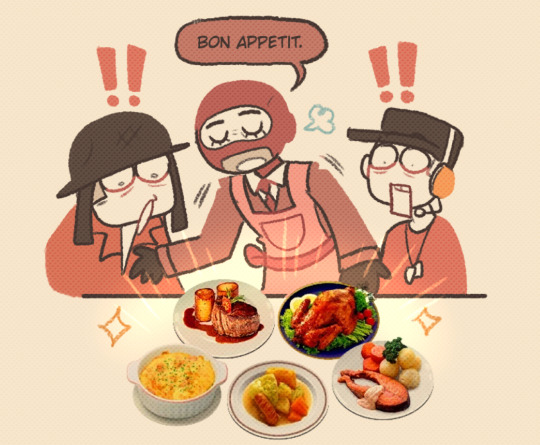
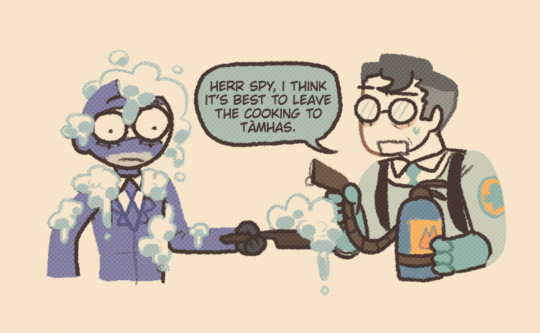
René doesn’t cook very often for his team, but when he does, everyone’s always BLOWN AWAY by this guy’s cooking! René’s really bad at taking compliments, though— (“Cooking food that’s remotely edible isn’t a compliment, it’s basic survival.”) —but rest assured he’ll be thinking about it for the next month. Jacques, however… Do NOT let this guy into the kitchen. Ever. The BLU base has a special fire extinguisher “In Case Spy Decides To Turn On The Stove”
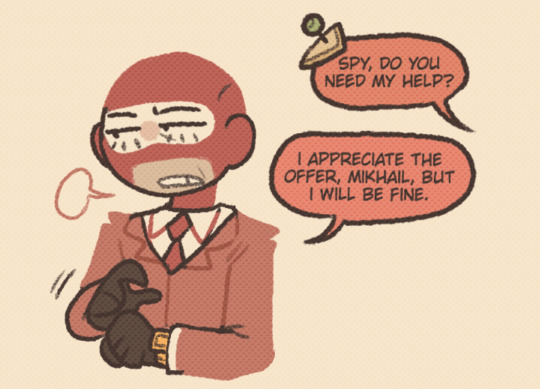
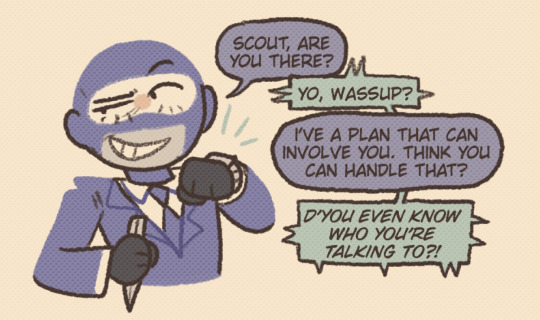
oooh, this one is an hc and a HALF to me. René much prefers working alone. It’s just in his nature, being isolated and whatnot. He likes to deal with things by himself– maybe he doesn’t want to burden others? On the contrary, Jacques NEVER works alone. It’s a trait he’s had even before being hired to BLU. You never know when things could go wrong, so it’s best to have someone else to fall back to… or someone else you can blame!
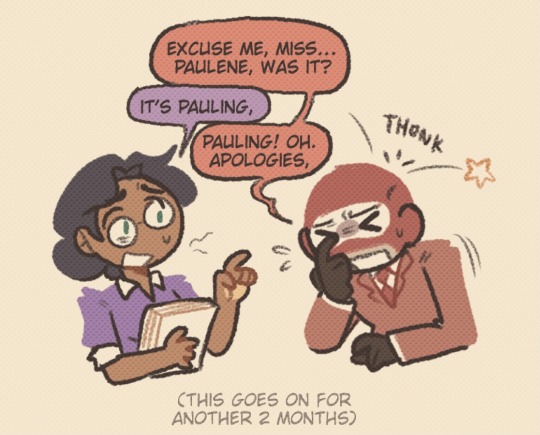
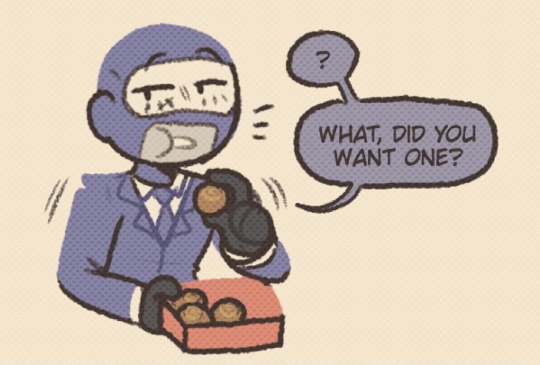
these hcs both have something to do with how René and Jacques show their trust in other people :) it’s a bit convoluted but it gets there:
René is, amusingly, very bad at remembering names. Almost laughably bad. There have been many-a-story of his days before RED where he’d get a target’s name wrong, even after he’d repeated it in his head dozens of times over. Names are difficult for him, so if he remembers yours, it means you mean a lot to him! He prefers using his teammates’ names rather than their titles. René is unaware of how charming this specifc trait is to his coworkers (they saw how much work and effort it took for him to memorize their names, they’re just happy with how far he’s come!)
Jacques has a… to put simply, very complicated relationship with food. But the one thing he’ll never turn down is sweets. His favorites especially being chocolate bonbons. Jacques has a hard time eating in front of others, let alone sharing his food! But if he genuinely likes and trusts you enough, he’d have half the mind to share with you. Admittedly, he hasn’t brought himself to share with most of the members of his team yet, except for a select few. Mostly BLU Medic and BLU Sniper.
—
and of course, eventually, EVENTUALLY, these two also become friends! it took a little bit but believe me, they both respect each other’s skill in their job :)
AHHg i could go sooo much longer about them— from things like their physical traits (how much teeth they have? it’s a pressing question) or different periods of their life (why did rené have to leave his family? why was jacques imprisoned for the last time?) BUT this post is so… so, so long. My fingers hurt from typing
If you’ve managed to read through this Beast, THANK YOU RAAHH!!! thanks so much for asking this, too. i hope to spare more hcs someday. hehe ^_^
#team fortress 2#tf2#spy tf2#tf2 spy#era.png#id in alt text#VERY LONG POST !!! very text heavy aaouhg#ok its taking all of my courage to make this post but i promised myself i’d get it out before i-#-turned nineteen LFJDKG. so. here they are :) rené and jacques my pookies…#UMM… idk what else to say here. thanks for asking and if you read this: THANK YOU ALSO ^_^#tumblr does NAWT want to format this post properly im going to pull my hair out#smoking#ask to tag#JUST IN CASE !!! there’s some slight implications of stuff here and there so if anyone needs anything tagged then feel free to lmk!#i also evidently have. a LOT of hcs regarding the BLU team. coughs. dont worry about that right now. Dont worry about it#era.txt#anon
706 notes
·
View notes
Note
I have encountered issues with JVP in the past in regards to not accommodating kashrut/shabbat observance (and wheelchairs), but previously hasn’t heard about the Mikvah thing. Do you have any sources I can refer to?
Oh boy. Oh boy oh boy oh boy. The noise I made when I saw this ask.
You are probably unaware but I have literally been working on a post on this topic since February. Bless you for asking me about it and giving me a reason to share it. Genuinely. I'm delighted.
Without further ado, now that I've finally finished:
On the JVP Mikveh BS
Some of you are no doubt aware of the Jewish Voice for Peace Mikveh Guide (on JVP’s website here, and here on the Wayback Machine in case that link breaks). You may have seen the post I reblogged about it, you may have seen the post about JVP in general on @is-the-thing-actually-Jewish, or you may have heard about it elsewhere. Or maybe you’ve somehow managed to avoid all knowledge of its existence. (God I wish that were me.) Even if you know about it, even if you’ve scanned through it, you probably haven’t taken the time to read it through properly.
I have.
God help me.
I was originally looking through it to help draft the @is-the-thing-actually-Jewish post back in February, but some terrible combination of horror, indignation, and probably masochism compelled me to do a close reading, so that I could write this analysis and share it with you, dear readers. For those of you who’ve never heard of a mikvah, for those of you who’ve immersed in one, for those of you who’ve studied it intensely—I give you this, the fruit of my suffering, so you too can understand why “Mikveh: A Purification Ritual for Personal and Collective Transformation,” written by Zohar Lev Cunningham and Rebekah Erev for Jewish Voice for Peace has got so many people up in arms.
Brace yourselves. It’s going to be a long journey.
First off, a disclaimer: When I say something is “required in Jewish law” or whatnot, I’m talking about in traditional practice / Torah-observant communities; what is often called “Orthodox.” There’s a wide range of Jewish practice, and what is required in frum (observant) Judaism may not be required in Reform Judaism, etc. Don’t at me.
Second note: I myself am Modern Orthodox, and come from that perspective. I’m also very much more on the rationalist side than the mysticism side of things. I did run this past people from other communities. Still, if I’ve missed or misrepresented something, it was my error and was not meant maliciously.
Third: I am not a rabbi. I am a nerd who likes explaining things and doing deep dives. Again, I may have made errors–please let me know if you spot any, and I’d be happy to discuss them.
Now then. Before we get into the text itself, let’s give some background.
WHAT IS THIS MIKVEH THING ANYWAY?
A mikveh (or mikvah, both they and I switch between spellings; plural mikva’ot) is a Jewish ritual bath, sometimes translated as an immersion pool. Some communities or organizations that run mikva’ot will have a single all-purpose all-purpose, some have separate human- and utensil-pools, and some have separate women’s and men’s pools. The majority of the water in a mikvah has to be “living waters,” i.e. naturally collected rather than from a tap or a bucket. Some natural bodies of water can also be used, such as the ocean and some rivers (ask your local rabbi). The construction is complicated and has extremely detailed requirements. Here’s an example of a modern mikvah:

(By Wikimedia Commons (ויקיגמדון) - Own work, Public Domain, https://commons.wikimedia.org/w/index.php?curid=17373540)
Whoever is being dunked (the scientific term) has to be entirely immersed, and the water has to be in direct contact with all of them. That means no clothes, no makeup, no hair floating on the top of the water, no feet touching the floor, no clenched fists. You have to be completely clean as well, so no dirt is obstructing you from the water.
In essence, a person or thing is immersed in a mikvah to change their/its state from tameh (ritually “impure”) to tahor (ritually “pure”). I use quotes because “pure/impure” aren’t really good translations—they have value judgments that tameh/tahor don’t. There’s nothing wrong with being tameh, you aren’t lesser because you are tameh—it’s just a state one enters when one comes into contact with death and related concepts. (There are also different levels of both.) As a matter of fact, technically speaking even after going to a mikvah basically all people are tameh now—the tum’ah (“impurity,” sort of) that comes from contact with dead humans can only be removed by the Red Heifer offering (see Numbers 19), which we can’t do without the Temple. (Why I say “all” even if you’ve never been to a funeral is a much much longer tangent that I’ll spare you for now.) To quote one of my editors on this, mikvah is “about the natural oscillation between states of ritual purity and impurity. Men go to mikveh after having seminal emissions. Menstruating women go to mikveh on a monthly basis (emphasis added).” It’s just states of life.
In the days of the Temple, one had to be tahor to enter it (the Temple). Archaeologists have found a ton of ancient mikva’ot in Jerusalem that were presumably used by people visiting the Temple, which personally I think is extremely cool.
Nowadays, there are three main traditionally required uses for a mikvah. First, and most importantly, observant married women will go about once a month as part of their niddah (menstrual) cycle, part of practice known as Taharat HaMishpacha, or “Family ‘Purity,’” which at its root is a way to sanctify the relationship between spouses. Until she immerses, a wife and husband cannot resume relations. And not just sex—in some communities, they can’t sleep in the same bed or even have any physical contact at all.
The second use is for conversion—immersion is a central part of the conversion ceremony. One enters the water a gentile, and emerges a Jew.
The third usage is a bit different as it’s not for people. Tableware—plates, cups, etc.—made of certain materials have to be immersed before they can be used. This isn’t what the Guide is about, so I’m not going to go into that as much, but felt remiss if I didn’t mention it was a thing. If you want to know more, Chabad has an article on it here.
Aside from uses required by Jewish law, there is a strong tradition in some communities for men to go to the mikveh just before Yom Kippur, or sometimes every week before the Sabbath, to enter the holiday in as “pure” a state as possible these days. (The things they’re “purifying” from still made them tameh, it just matters less without the Temple.) There is also a strong custom to immerse before one’s wedding. Less traditional communities have also started using mikvah for other transitional moments, such as significant birthdays or remission from cancer. There has recently been an “open mikvah” movement, which “is committed to making mikveh accessible to Jews of all denominations, ages, genders, sexual orientations, and abilities (Rising Tide Network old website, “Why Open Mikvah”).”
To quote others:
No other religious establishment, structure or rite can affect the Jew in this way and, indeed, on such an essential level. —Rebbetzen Rivkah Slonim, Total Immersion, as quoted on Chabad.org
The mikveh is one of the most important parts of a Jewish community. —Kylie Ora Lobell, “What Is a Mikveh?” on Aish.com
How important? According to Rav Moshe Feinstein, one of the great American rabbis of the 20th century, one should build a mikveh before building a synagogue in a town that has neither, and even in a town where there is a mikveh but it’s an inconvenient distance away from the community (Igros Moshe: Choshen Mishpat Chelek 1 Siman 42).
A mikveh is more important than a synagogue.
I’d say that’s pretty important.
Tl;dr: A mikveh is the conduit through which a convert becomes a part of the Jewish people. It is traditionally used to sanctify the relationship between spouses. It was required for people to go to the Temple, back when we still had it. It is extremely central to Jewish practice.
So. What does JVP have to say about it?
THE JVP MIKVEH GUIDE
The document in question is titled “Mikveh: A Purification Ritual for Personal and Collective Transformation,” by Zohar Lev Cunningham and Rebekah Erev. I am largely going to quote directly from the text and then analyze and explain it.
Now let me be clear. I’m not trying to say the authors aren’t Jewish. I’m not saying they’re bad people, or that you should attack them. I am not intending any of this as an ad hominem attack. But given the contents of this document, I do think it is fair to call this appropriative, even if it is of their own culture—in the same way someone can have internalized racism, or twist feminism into being a TERF, I would argue that this is twisting Judaism into paganism. In fact, while I use “appropriation” throughout this document, an extremely useful term that’s been coined recently is “cultural expropriation”--essentially, appropriative actions done by rogue members of the community in question. One example of this would be the Kabbalah Centre in Los Angeles, which is the source of a lot of the Madonna-style “pop Kabbalah.” It was founded by an Orthodox Jewish couple, but it and its followers are widely criticized by most Jewish communities. In much the same way, the Guide is expropriation.
We start off with a note from the authors.
Hello, Welcome to the Simple Mikveh Guide. This work comes out of many years of reclaiming and re-visioning mikveh. The intention of this guide is to acknowledge and give some context to what mikveh is, provide resources related to mainstream understanding of mikveh and also provide alternative mikveh ideas. Blessings for enjoyment of this wonderful, simple Jewish ritual! Zohar Lev Cunningham & Rebekah Erev
This is fairly normal, though “alternative mikveh ideas” is a bit odd to say. I also find “blessings for enjoyment” to be odd phrasing, somewhat reminiscent of the Wiccan “Blessed Be,” but it could be a typo.
The first main section is titled “Intro to Mikveh,” and begins as follows:
Mikveh is an ancient Jewish ritual practice of water immersion, traditionally used for cleansing, purification, and transformation. It's been conventionally used for conversion to Judaism, for brides, and for niddah, the practice of cleansing after menstruation.
This is relatively accurate, and credit where credit is due avoids making niddah out to be patriarchal BS. I do object slightly to “purify” as a translation without further explanation, as I went into above, and “cleansing” for similar reasons—it implies “dirtiness,’ which isn’t really what tum’ah is about. Also, though this is pretty minor, a bride going to the mikveh before her wedding is actually a part of the laws of niddah. I’d also note that they entirely leave out that it was important for going to the Temple in ancient times, though given this is published by JVP I’m not terribly surprised.
For Jews, water signifies the transformative moment from slavery in Egypt, through the parted Red Sea, and into freedom.
On the one hand, I suppose it’s not unreasonable to connect the Red Sea and mikveh, though I think I’d be more likely to hear it the other way around (i.e. “going through the sea was like the people immersing in a mikveh and being ‘cleansed,’ so to speak”). Though they were, rather importantly, not actually immersed in the water. However I don’t think I’d say water as a whole signifies the Splitting of the Sea. In fact, water imagery is more often used to signify the Torah, see for instance Bava Kamma 82a.
There is also a mystical connection to mikveh as a metaphor for the womb of the divine.
A mikveh being like a womb is also not uncommon. It’s found in the Reishis Chochmah (Shia’ar HaAhavah 11,58) and the writing of Rabbi Aryeh Kaplan (The Aryeh Kaplan Anthology, vol 2., p. 382; both as quoted in 50 Mikvahs That Shaped History, by Rabbi Ephraim Meth), see also “The Mikveh’s Significance in Traditional Conversion” by Rabbi Maurice Lamm on myjewishlearning. Filled with water, you float in it, you emerge a new being (at least for conversion); it’s not an absurd comparison to draw. I’m not sure I’ve found anything for the Womb of the Divine specifically, though. (Also, Divine should definitely be capitalized.)
Entering a mikveh is a transformative and healing experience and we have long wondered why it is not available to more people, including the significant trans and queer populations in Jewish communities.
So. I am NOT going to say there’s no problem with homophobia and/or transphobia in Jewish communities. It’s definitely a community issue, and many communities are grappling with it in various ways as we speak. And I’m certainly not going to say the authors didn’t have the experience of not having a mikveh available to them—I don’t know their lives, I’m not going to police their experiences.
However, while Orthodox mikvahs are often still restricted to married women (who by virtue of the community will generally be cis and married to men) and potentially adult men (given the resources and customs, as mentioned above), there are plenty of more liberal mikva’ot these days. Some even explicitly offer rituals for queer events! The list of reasons to go to the mikvah linked up above, for instance, includes:

(Mayyim Hayyim, “Immersion Ceremonies”)
Again, that’s not to say there aren’t issues of queerphobia in the Jewish community, but if you are queer and want to go to the mikvah, there are options out there. If you’re looking, I’ve included some links at the end.
When we make ritual, we are working with the divine forces of presence and intention. The magic of mikveh comes in making contact with water. Contact with water marks a threshold and functions as a portal to bring closer our ritual intention/the world to come.
This is…a weird way to put things. I would say this is the start of the red flags. “When we make ritual,” first of all, is, to quote @the-library-alcove (who helped edit this), “a turn of phrase that is not typically associated with any branch of Jewish practice; we have a lot--a LOT--of rituals, and while it's certainly not completely outside of the realm of Jewish vernacular, the tone here, especially in light of the later sections, starts veering towards the vernacular of neo-paganism.” One might say “make kiddush” (the blessing over wine on Shabbos and holidays) or “make motzi” (the blessing over bread), but not generally “make ritual.”
The next section is titled “Who Gets to Do Mikveh?” Their answer:
Everyone! Mikveh practice is available to all of us as a healing tool at any time.
The healing tool part isn’t the original purpose of mikveh, but there are some who have used it as a part of emotional recovery from something traumatic, by marking a new state of being free from whatever caused it, see for instance Mayyim Hayyim’s list linked above.
The “everyone” bit is a little more complicated. To explain why, we’re going to skip ahead a little. (Some of these quotes will also be analyzed in full later.)
We want to make mikveh practice available as a tool to all Jews and non-Jews who want to heal wounds caused by white supremacy and colonialism. [..] To us, a queer mikveh welcomes anyone, regardless of spiritual background or not. […] Queer mikveh is accessible physically and spiritually to any and all people who are curious about it. You don't have to be a practicing Jew to enter queer mikveh. You don't have to be Jewish. (pg. 2, emphasis added)
Now, I am told there are mikva’ot that allow non-Jews to immerse. I have yet to find them, so I don’t know what rituals they allow non-Jews to do. I also haven’t been able to find any resources on non-Jews being allowed to immerse. I have found quite a few that explicitly prohibit it. If there are any sources you know of, please send them to me! I’d love to see them! But so far everything I have come across has said that mikvah immersion is a closed practice that only Jews can participate in. (Technically, to quote the lovely @etz-ashashiot, any non-Jew can do mikvah…once. And they won’t be non-Jews when they emerge. There is also one very extreme edge-case, which is absolutely not mainstream knowledge or practice, and basically isn’t actually done. You can message me if you’re curious, but it’s really not relevant to this–and even in that case, it is preferable to use a natural mikvah rather than a man-made one.)
If there are any legitimate sources that allow non-Jews to do a mikvah ritual, I would assume said non-Jews would be required to be respectful about it. Unfortunately, this is how the paragraph we began with continues:
Who Gets to Do Mikveh? Everyone! Mikveh practice is available to all of us as a healing tool at any time. You don't need any credentials. Your own wisdom is all the power you need to be a Jewish ritual leader. (emphasis added)
This is where we really go off the rails. First of all, you need more than “wisdom” to lead a Jewish ritual. You need to actually know what you’re doing. You can’t just say “oh you know what I feel like the right thing to do for morning prayers is to pray to the sun, because God created the sun so the sun is worth worshiping, and this is a Jewish ritual I’m doing.” That’s just idolatry. Like straight up I stole that from a midrash (oral tradition) about how humanity went from speaking with God in the Garden of Eden to worshiping idols in the time of Noah (given here by Maimonides; note that it continues for a few paragraphs after the one this link sends you to).
Second of all, this is particularly bad given this guide is explicitly to Jews and non-Jews. As @daughter-of-stories put it when she was going over an earlier draft of this analysis, “they are saying that non-Jews can just declare themselves Jewish ritual leaders based on nothing but their own ‘wisdom.’”
I hope I don’t need to explain why that’s extremely bad and gross?
While we’re on the topic of non-Jews using a mikvah, let’s take a moment to address an accusation commonly mentioned alongside the mikvah guide: that JVP also encourages (or encouraged) self-conversion.
I have been unable to find a separate document where they explicitly said so, or an older version of this document that does. This leads me to believe that either a) the accusation came from a misreading of this document, or b) there was a previous document that contained it which has since been deleted but was not archived in the Wayback Machine. EITHER is possible.
Even in the case that there was no such document, however, I would point out that such a suggestion can be read–intentionally or not–as implicit in this document. This is a guide for mikvah use by both Jews and non-Jews, and includes an idea that non-Jews can perform Jewish rituals on their own without any guidance or even background knowledge, as quoted above. Why would a non-Jew, coming into Jewish practice with very little knowledge, go looking to perform a mikvah ritual?
I would wager that the most well-known purpose of immersing in a mikvah is for the purpose of conversion.
Nowhere in this guide is there any explicit statement that you can do a self-conversion, but it also doesn’t say anywhere that you can’t, or that doing so is an exception to “you don’t need any credentials” or “your own wisdom is all the power you need to be a Jewish ritual leader.” It may not be their intention, but the phrasing clearly leaves it as an option.
Even if this were from a source that one otherwise loved, this would be upsetting and disappointing. The amount of exposure this document is getting may be at least in part because it comes from JVP, but the distress and dismay would be there regardless. If there is further vitriol, it’s only because JVP is often considered a legitimate source by outsiders, if no one else–in other words, by the very people least likely to have the background to know that this document isn’t trustworthy. It’s like the difference between your cousin telling you “the Aztecs were abducted by aliens” versus a mainstream news program like Fox reporting it. Both are frustrating and wrong, but one has significantly more potential harm than the other, and therefore is more likely to get widespread criticism (even if you complain about your cousin online).
On the other hand, as one of my editors pointed out in a moment of dark humor, they do say you don’t have to be Jewish to lead a Jewish ritual, so perhaps that mitigates this issue slightly by taking away a motivation to convert in the first place.
Returning to our document:
We do mikvahs in lakes, rivers, bathtubs, showers, outside in the rain, from teacups, and in our imaginations.
At this point the rails are but a distant memory.
In case you’ve forgotten what I said about this at the beginning of this post (and honestly I wouldn’t blame you, we’re on pg. 9 in my draft of this), there are extremely strict rules about what qualifies as a mikvah. Maimonides’s Mishnah Torah, just about the most comprehensive codex of Jewish law, has eleven chapters on the topic of the mikvah (though that includes immersion in it as well as construction of it). I’m not going to make you read through it, but let’s go through the list in this sentence:
Lakes and rivers: you might be able to use a river or lake as a mikvah, but you need to check with your local rabbinical authority, because not all of them qualify. In general, the waters must gather together naturally, from an underground spring or rainwater. In the latter case, the waters must be stationary rather than flowing. A river that dries up in a drought can’t be used, for instance. (The ocean counts as a spring, for this purpose.)
Bathtubs and showers: No. A man-made mikveh must be built into the ground or as an essential part of a building, unlike most bathtubs, and contain of a minimum of 200 gallons of rainwater, gathered and siphoned in a very particular way so as not to let it legally become “groundwater.” Also, it needs to be something you can immerse in, which a shower is not.
Outside in the rain: No? How would you even do that?? What??
Teacups: Even if you were Thumblina or K’tonton (Jewish Tom Thumb), and could actually immerse your entire body in a teacup, it wouldn’t be a kosher mikvah as a mivkah can’t be portable.
In your imagination: Obviously not, what the heck are you even talking about
We will (unfortunately) be coming back to the teacup thing, but for now suffice it to say most of these are extremely Not A Thing.
Mikveh has been continually practiced since ancient Judaism. It is an offering of unbroken Jewish lineage that we have claimed/reclaimed as our own.
I find the use of “claimed/reclaimed” fascinating here, given this guide is explicitly for non-Jews—who, whether or not they are permitted to use a mikvah, certainly shouldn’t be claiming it as their own—as well as Jews. I find it particularly interesting given the lack of clarity of how much of JVP’s membership is actually Jewish and JVP’s history of encouraging non-Jewish members to post “as Jews.” Kind of telling on yourselves a bit, there.
(Once again, I’m not commenting on the authors themselves, but the organization they represent here and the audience they are speaking to/for.)
We want to make mikveh practice available as a tool to all Jews and non-Jews who want to heal wounds caused by white supremacy and colonialism. We want to make mikveh practice available for healing our bodies, spirits, and the earth.
Setting aside the “Jews and non-Jews” thing, since I talked about that earlier and this is already extremely long, I do want to highlight the end of the paragraph. While there are some modern uses of the mikvah to (sort of) heal the spirit, I haven’t heard of anyone using a mikvah to heal the body—as a general rule Jews don’t tend to do faith healing, though of course some sects are the exception. Healing the earth, however, is absolutely not a use of a mikvah. Mikvah rituals, as we’ve now mentioned several times, are about tahara of a person or an object, and require immersion. You can’t immerse the earth in a mikvah. The earth contains mikva’ot. Healing the earth with a mikvah is a very strange worship (IYKYK).
We acknowledge that not all beings have consistent access to water, including Palestinians.
This is a tragedy, no question. I don't mean to minimize that. However, it is also unrelated to the matter at hand. The Guide also doesn’t give any recommendations on how we can help improve water access, so this lip service is all you get.
A lack of water does not make mikveh practice inaccessible.
Yes, in fact, it does. Without a kosher mikvah of one variety or another one cannot do anything that requires a mikvah. That’s why building a kosher one is so important. I haven’t gone looking for it, but while I’m sure there’s lots (and lots and lots and lots) of Rabbinic responsa out there of what to do in drought situations, you definitely do need water in all but the most extreme cases. If you do not have water, AYLR (Ask Your Local Rabbi)--don’t do whatever this is.
The spirit of water can be present with us if we choose to call for water, so even when water is not physically available to us we can engage in mikveh practice.
This is just straight up avodah zarah (“strange worship,” i.e. idolatry) as far as I can tell. The “spirit of the water”? What? We’re not Babylonians worshiping Tiamat. What source is there for this? Is there a source??
Like all material resources, the ways water is or is not available to us is shaped by our geographic and social locations. The ways we relate to water, what we decide is clean, treyf (dirty), drinkable, bathable, how much we use, how much we save, varies depending on our experiences. We invite you to decide what is clean and holy for your own body and spiritual practice.
This is going to require some breaking down.
To start with, let’s define “treyf.” To quote myjewishlearning, “Treyf (sometimes spelled treif or treyfe) is a Yiddish word used for something that is not kosher [lit. "fit"]. The word treyf is derived from the Hebrew word treifah, which appears several times in the Bible and means 'flesh torn by beasts.' The Torah prohibits eating flesh torn by beasts, and so the word treifah came to stand in for all forbidden foods.”
You may note the lack of the word “dirty” in this definition, or any other value judgments. Myjewishlearning continues, “over time, the words kosher and treyf have been used colloquially beyond the world of food to describe anything that Jews deem fit or unfit.” While this does have something of a value judgment, it’s still not “dirty.” I can’t say why the authors chose to translate the word this way, but…I don’t like it.
Now, when it comes to what is kosher or treyf, food and drink are most certainly not based on “our experiences.” There are entire books on the rules of kashrut; it generally takes years of study to understand all the minutiae. Even as someone who was raised in a kosher household, when I worked as a mashgicha (kosher certification inspector) I needed special training. What is considered kadosh (“sacred” or “holy,” though again that’s not a perfect translation) or tahor is also determined by very strict rules. We don’t just decide things based on “vibes.” That’s not how anything in Jewish practice works.
Water, in fact, is always kosher to drink unless it has bugs or something else treyf in it. And mikvehs aren’t even always what I’d consider “drinkable;” I always wash utensils I’ve brought to the mikvah before I use them.
We come to our next heading: What is Queer Mikveh?
What is Queer Mikveh? To us, a queer mikveh welcomes anyone, regardless of spiritual background or not.
As I’ve said above, I have yet to find a single source (seriously if you have one please send it to me) that says non-Jews can go to a mikvah. As one of my editors for this put it, “to spin appropriation of Jewish closed practices as ‘queer’ is not only icky but deeply disrespectful to actual queer Jews.”
Also, and this is not remotely the point, but “regardless of spiritual background or not” is almost incoherently poor writing.
As Jews in diaspora we want to share and use our ritual practices for healing the land and waters we are visitors on for the liberation of all beings.
I have tried to be semi-professional about this analysis, but. “Jews in the diaspora,” you say. Tell me, JVP, where are we in the diaspora from? Hm? Where are we in diaspora from? Which land do we come from? Which land are we indigenous to, JVP? Do tell.
Returning to the point, I would repeat that mikvah has nothing to do with “healing the land and waters.” It’s ritual purification of whatever is immersed in it. You want to heal the land and waters? Go to your local environmental group, and/or whoever maintains your local land and waters. Pick up trash. Start recycling. Weed invasive species. Call your government and tell them to support green energy. You want liberation for all beings? Fight bigotry—including antisemitism. Judaism believes in action—go act. Appropriating rituals from a closed religion doesn’t liberate anyone.
We have come up with this working definition and welcome feedback!
Oh good, maybe I won’t be yelled at for posting this (she said dubiously).
Queer mikveh is a ritual of Jews in diaspora. We believe the way we work for freedom for all beings is by using the gifts of our ancestors for the greatest good. We bring our rituals as gifts.
I have nothing in particular new to say about this, except that I find the idea of “bringing our rituals as gifts” for anyone to use deeply uncomfortable, given Judaism is a closed religion that strongly discourages non-Jews from joining us, and that has had literal millennia of people appropriating from us.
It acknowledges that our path is to live on lands that are not historically our peoples [sic] and we honor the Indigenous ancestors of the land we live on, doing mikveh as an anti-colonialist ritual for collective and personal liberation.
Again I would love so much for JVP to tell us which lands would historically be our people’s. What land do Jews come from, JVP? What land is it we do have a historical connection to? What land do our Indigenous ancestors come from??
And why does it have to be our path to live on lands other than that one?
Secondly, to quote the lovely @daughter-of-stories again when she was editing this, “Mikveh as anti-colonialism, aside from not being what Mikveh is, kinda implies that you can cleanse the land of the sins of colonialism. So (a) that’s just a weird bastardization of baptism since, mikveh isn’t about cleansing from sin, and (b) so does that mean the colonialism is erased? Now we don’t have to actually deal with how it affects actual indigenous people?”
I’m sure that (b) isn’t their intent, but I will say that once again they don’t give any material suggestions for how to actually liberate any collectives or persons from colonialism in this document, including any links to other pages on their own website*, which surely would have been easy enough. It comes across as very performative.
*I disagree strongly with most of their methods, but at least they are suggesting something.
Queer mikveh is a physical or spiritual space that uses the technologies of water and the Jewish practice of mikveh to mark transitions. Transition to be interpreted by individuals and individual ritual.
I have no idea what the “technologies of water” are. Also usage of a mikvah to mark transitions beyond ritual states is a fairly new innovation, as mentioned above.
Queer mikveh in it's [sic] essence honors the story of the water. The historical stories of the water we immerse in, the stories of our own bodies as water and the future story we vision [sic].
This just sounds like a pagan spinoff of baptism to me, if I’m being honest. Which would be non-Jewish in several ways.
Queer mikveh is accessible physically and spiritually to any and all people who are curious about it. You don't have to be a practicing Jew to enter queer mikveh. You don't have to be Jewish.
First off, once again whether or not non-Jews can use mikvah seems at best extremely iffy. Secondly, accessibility in mikva’ot is, as one of my editors put it, “a continual discussion.” We have records of discussions regarding access for those with physical disabilities going back at least to the 15th century (Shut Mahari Bruna, 106; as quoted in 50 Mikvahs That Shaped History by Rabbi Ephraim Meth), and in the modern era there are mikva’ot that have lifts or other accessibility aids. That said, many mikva’ot, especially older ones, are still not accessible–and many mikva’ot don’t have the money to retrofit or renovate. Mikvah.org’s directory listings (linked at the end of this) notes whether various mikva’ot are accessible, if you are looking for one in your area. If you want to help make mikva’ot more accessible to the disabled, consider donating to an existing mikvah to help them pay for renovations or otherwise (respectfully) getting involved in the community. If you want to help make mikva’ot more accessible for non-Orthodox Jews, try donating to an open mikvah (see link to a map of Rising Tide members at the end of this essay) or other non-Orthodox mikvah.
Queer mikveh is an earth and water honoring ritual.
Not even a little. We do have (or had) rituals that honor the earth or water, at least to an extent–the Simchat Beit HaSho’evah (explanations here and here) was a celebration surrounding water; most of our holidays are harvest festivals to some extent or another; there are a large number of agricultural mitzvahs (though most can only be done in Israel, which I suppose wouldn’t work for JVP). (Note: mitzvahs are commandments and/or good deeds.) Even those, though, aren’t about the water or earth on their own, per se, but rather about honoring them as God’s gift to us. This description of mikvah sounds more Pagan or Wiccan–which is fine, but isn’t Jewish.
Queer mikveh exists whenever a queer person or queers gather to do mikveh. Every person is their own spiritual authority and has the power to create their own ritual for individual or collective healing.
Absolutely, anyone can create their own rituals for anything they want. But it probably won’t be a mikvah ritual, and it probably won’t be Jewish.
Do you know what it’s called when you make up your own ritual and claim that it’s actually a completely valid part of an established closed practice of which you aren’t part? (Remember—this document is aimed just as much at non-Jews as at Jews.)
It’s called appropriation.
With the next section, “Some Ideas for Mikveh Preparation,” we begin page three.
(Yes, we’re only on page three of seven. I’m so sorry.)
The most important part of mikveh preparation is setting an intention.
This isn’t entirely wrong, as you do have to have in mind the intention of fulfilling a mitzvah when you perform one.
Because mikveh is a ritual most used to mark transitions, you can frame your intention in that way.
To quote myself above, “usage of a mikvah to mark transitions beyond ritual states is a fairly new innovation.” I’d hardly say it is mostly used for marking transitions.
You can do journaling or talk with friends to connect with the Jewish month, Jewish holiday, Shabbat, the moon phase, and elements of the season that would support your intention.
If this were a guide for only Jews, or there was some sort of note saying this section was only for Jews, I would have less of a problem. But given neither is true, they are encouraging non-Jews to use the Jewish calendar for what is, from the rest of the descriptions in the Guide, a magical earth healing ritual.
This is 100% straight up appropriation.
The Jewish calendar is Jewish. Marking the new moon and creating a calendar was the first commandment given to us as a people, upon the exodus from Egypt. Nearly all our holidays are (aside from the harvest component, which is based on the Israeli agricultural seasons and required harvest offerings) based on specific parts of Jewish history. Passover celebrates the Exodus and our becoming a nation. Sukkot celebrates the Clouds of Glory that protected us in the desert. Shavuot celebrates being given the Torah.
According to some opinions, non-Jews literally aren’t allowed to keep Shabbat.
If you are a non-Jew and you are basing the collective earth healing ritual you have created under your own spiritual authority around Jewish holidays and calling it “mikvah,” you are appropriating Judaism.
Full stop.
This isn’t even taking into account the generally Pagan/witchy feel of the paragraph, with “moon phases” and “elements of the season.” Again, if you want to be a Pagan be a Pagan, but don’t call it Jewish.
Things only go further downhill with their next suggestion for preparation before you go to the mikvah.
Divination: A lot can be said about divination practices and Judaism.
There certainly is a lot to be said. First and foremost, there’s the fact that divination is forbidden in Judaism.

(Screenshot of Leviticus 19:26 from sefaria.org)
One method of divination they suggest is Tarot, which is a European method of cartomancy that seems to have begun somewhere in the 19th century, though the cards start showing up around the 15th. While early occultists tried to tie it to various older forms of mysticism, including Kabbalah, this was, to put it lightly, complete nonsense. (Disclaimer: this information comes from wikipedia; I’ve already spent so much time researching the mikvah stuff that I do not have the energy or interest to do a deep dive into the origin of Tarot. It isn’t Jewish, the rest is honestly just details.)
I have nothing against Tarot. I think it’s neat! The cards are often lovely! I have a couple of decks myself, and I use them for fun and card games. But divination via tarot is not Jewish. If I do any spreads, I make it very clear to anyone I’m doing it with that it is for fun and/or as a self-reflection tool, not as magic. Because that is extremely not allowed in Judaism.
The authors suggest a few decks to use, one of which is by one of the authors themselves. Another is “The Kabbalah Deck,” which—holy appropriation, Batman!
In case anyone is unaware, Kabbalah (Jewish mysticism) is an extremely closed Jewish practice, even within Judaism. Traditionally it shouldn’t be studied by anyone who hasn’t already studied every other Jewish text (of which there are, I remind you, a lot), because it’s so easy to misinterpret. I mentioned this above briefly when explaining cultural expropriation. Pop Kabbalah (what Madonna does, what you see when they talk about “Ancient Kabbalistic Texts” on shows like Supernatural, the nonsense occultists and New-Agers like to say is “ancient Kabbalistic” whatever, it’s a wide span of appropriative BS) is gross, combining Kabbalah with Tarot is extremely gross. I’m not 100% sure, as the link in the pdf doesn’t work, but I believe they are referring to this deck by Edward Hoffman. For those of you who don’t want to click through, the Amazon description includes this:

(Screenshot from Amazon)
Returning to our text:
Another practice that's been used in Judaism for centuries is bibliomancy. You can use a book you find meaningful (or the Torah) and ask a question. Then, close your eyes, open the book to a page and place your finger down. Interpret the word or sentence you pointed at to help guide you to answer your question.
Bibliomancy with a chumash (Pentateuch) or tanach (Bible) in Jewish magic is kind of a thing, but the tradition of Jewish magic as a whole is very complicated and could be its own entirely different post. This one is already long enough. This usage of bibliomancy is clearly just appropriative new-age BS, though, especially given you can use “[any] book you find meaningful.”
Also, if you aren’t Jewish, please don’t use the Torah for ritual purposes unless you are doing it under very specific circumstances under the laws for B’nei Noach (“Children of Noah,” also called Righteous Gentiles; non-Jews who follow the 7 Noachide Laws).
Sit with your general intention or if you aren't sure, pose a question to the divination tool you are using. "What should be my intention for this mikveh?" "What needs transforming in my life?" "How can I transform my relationship with my body?"
As I hope I’ve made clear, there are very specific times when one uses a mikvah, even with more modern Open Mikvah rituals. You always know what your intention is well before going—to make yourself tahor, or mark a specific event. I’m not here to police how someone prepares mentally before they immerse—meditation is fine, even encouraged. But magic? Like this? That’s not a thing. And given the fact that divination specifically is not only discouraged but forbidden, this section in particular upset a lot of Jews who read it.
Those of us already upset by everything we’ve already covered were not comforted by how the Guide continues.
How to Prepare Physically For Mikveh: Some people like to think about entering the mikveh in the way their body was when they were born. By this we mean naked, without jewelry, with clean fingernails and brushed hair. This framing can be meaningful for many people.
We went into this at the beginning of this essay (about 6500 words ago), but this is in fact how Jewish law mandates one is required to immerse. This is certainly the case in most communities, whether you are immersing due to an obligation (as a married woman or a bride about to be married) or due to custom (as men in post-Temple practice) or due to non-traditional immersion (as someone coming out); wherever on the spectrum of observance one falls (as far as I could find). A mikvah isn’t a bath, it’s not about physical cleanliness—you must first thoroughly clean yourself, clip your nails, and brush your teeth. Nail polish and makeup are removed. There can’t be any barriers between you and the water. Most mikva’ot these days, particularly women’s mikva’ot, have preparation rooms so you can prep on site. When you immerse, you have to submerge completely—your hair can’t be floating above the water, your mouth can’t be pursed tightly, your hands can’t be clenched so the water can’t get to your palms. If you do it wrong, it doesn’t count and you have to do it again. It’s not a “framing,” it’s a ritual practice governed by ritual law.
We suggest you do mikveh in the way you feel comfortable for you and your experience.
This isn’t how this works. If you have a particularly extreme case, you can talk to a rabbi to see if there are any workarounds—for example, if excessive embarrassment would distract you from the ritual, you may be able to wear clothes that are loose enough that the water still makes contact with every millimeter of skin. But you need to consult with someone who knows the minutiae of the laws and requirements so you know if any exceptions or workarounds apply to you. That’s what a rabbi is for. That’s why they need to go to rabbinical school and get ordination. They have to study. That’s why you need to find a rabbi whose knowledge and personality you trust. For someone calling themselves a religious authority in Judaism to say “you can do whatever, no biggie” with such a critical ritual is…I’m not sure what the word I want is.
The idea is to feel vulnerable but also to claim your body as a powerful site of change that has the power to move us close to our now unrecognizable futures.
The idea is to bathe in the living waters and enter a state of taharah. Though that could be an idea you have in mind while you are doing it, I suppose. I could see at least one writer I know of saying something like this to specifically menstrual married (presumably cis) women performing Taharat HaMishpacha (family taharah, see above).
For some people, doing mikveh in drag will feel most vulnerable, with all your make-up and best attire.
Absolutely not a thing. As I said last paragraph, the goal isn’t to feel vulnerable or powerful or anything. It may feel vulnerable or powerful, but that is entirely besides the actual purpose of the ritual. What you get out of it on a personal emotional level has nothing to do with the religious goal of the religious practice.
And if you are wondering how one would submerge oneself in water in full drag, don’t worry, we’ll get there soon.
For some, wearing a cloth around your body until just before you dip is meaningful.
This is just how it’s usually done. Generally one is provided with a bathrobe, and one removes it before entering. You don’t just wander around the building naked. Or the beach, if you’re using the ocean.
If you were born intersex and your genitalia was changed without your consent, thinking about your body as perfect, however you were born, can be loving.
I’m not intersex, so I’m not going to comment on the specifics here. If you are and that’s meaningful to you, more power to you.
We enter a new section, at the top of page 4.
Where To Do Mikveh: There is much midrash around what constitutes a mikveh.
“Midrash” is not the word they want here. The midrash is the non-legal side of the oral tradition, often taking the form of allegory or parable. This is as opposed to the mishna, which is the halachic (legal) side of the oral tradition. They were both written down around the same time, but most midrashim (plural) are in their own books, rather than incorporated in the mishna.
There is, however, a great deal of rabbinic discussion, in the form of mishna, gemara, teshuvot (responsa), legal codices, and various other genres of Jewish writing. More properly this could have just said “there is much discussion around what constitutes a mikveh.”
Most mikvot currently exist in Orthodox synagogues[—]
This is perhaps a minor quibble, but I don’t know that I’d say they’re generally in synagogues. They are frequently associated with a local congregation, but are often in a separate building.
[—]but there is a growing movement to create more diverse and inclusive spaces for mikveh. Mayyim Hayyim is a wonderful resource with a physical body of water mikveh space. Immerse NYC is a newer organization training people of all genders to be mikveh guides. They also work to find gender inclusive spaces for people to do mikveh in NYC.
This is true! Mayyim Hayyim is a wonderful organization I’ve never heard anything bad about, and ImmerseNYC also seems like an excellent organization. Both also only allow Jews (in which group I am including in-process converts) to immerse.
The mikveh guides thing I didn’t explain above, so I’ll take a moment to do so here. Because the rules of immersion are so strict, and because it’s hard to tell if you are completely immersed when you are underwater, most mikva’ot have a guide helping you. Depending on the circumstance and the mikvah, and depending on the patron’s comfort, who and how they do their jobs can differ somewhat. For a woman immersing after niddah, it will usually be another woman who will hold up the towel or bathrobe for you while you get in the water, and will only look from behind it once you are immersed to make sure you are completely submerged. If you are converting, customs vary. Some communities require men to witness the immersion regardless of the convert’s gender, which is very much an ongoing discussion in those communities. Even in those cases, to my knowledge they will only look once the convert is in the water, and there will likely still be a female attendant if the convert is a woman. While there are negative experiences people have had, it is very much an intra-community issue. We’re working on it.
Mikveh can be done in a natural body of water.
Again, this is true, though not all bodies of water work, so AYLR (Ask Your Local Rabbi).
Some people are also making swimming pools holy places of mikveh.
We’ve already explained above why this is nonsense.
In the Mishneh (the book that makes commentary on the torah [sic]) there are arguments as to what constitutes a mikveh and how much water from a spring or well or rainwater must be present.
The main issue in this section is their definition of the Mishneh. As I explained above, the Mishna (same thing, transliteration is not an exact science) is the major compilation of the Oral Torah, the oral tradition that was written down by Rabbi Judah Ha-Nasi so it wouldn’t be lost in the face of exile and assimilation. It’s not so much a commentary on the (Written) Torah as an expansion of it to extrapolate the religious laws we follow. It’s certainly not “the book that makes commentary on the Torah.” We have literally hundreds of books of commentary. That’s probably underestimating. Jews have been around for a long time, and we have been analyzing and discussing the Torah for nearly as long. There are so many commentaries on the Torah.
The second issue is that while there are arguments in the Mishna and Gemara (the oral discussion on the Mishna that was written down even later), they do generally result in a final decision of some sort. Usually whichever side has the majority wins. Variations between communities are still very much a thing, and I can explain why in another post if people are interested, but there usually is a base agreement.
We are of the school that says you decide for yourself what works.
The phrasing they use here makes it sound as though that’s a legitimate opinion in the Mishnah. I cannot emphasize how much that is not the case. While I myself have not finished learning the entire Mishnah, I would be willing to wager a great deal that “whatever works for you” isn’t a stance on any legal matter there. That’s just not how it works. While some modern branches of Judaism may have that as a position, it is definitely not Mishnaic.
If you are concerned about Jewish law, the ocean is always a good choice. There are no conflicting arguments about the ocean as a mikveh. As the wise maggid Jhos Singer says in reference to the ocean, "It's [sic] becomes a mikveh when we call it a mikveh." Done.
(To clarify, I don’t know if that typo was carried over from the source of the original quote or not.)
This is true. However if you are concerned about Jewish law I would very much urge you to look to other sources than this one—be that your local rabbi or rebbetzen, the staff at your local mikvah, or a reliable website that actually goes into the proper requirements. If you want to use a mikveh according to Jewish law, please do not use this document as your guide.
We recognize immersion in water does not work for every body. Therefore, a guiding principle for where to do a mikveh is: do a mikveh in a place that is sacred to you. Your body is always holy and your body is made of mostly water. Later in this guide there is more information on mikveh with no immersion required.
I cannot emphasize how much I have never once heard this before. This, to me, reads like New Age nonsense. If you are unable to immerse in a mikvah, talk to your rabbi. Don’t do…whatever this is.
Our next section is a short one.
Who To Do it With: Do mikveh with people you feel comfortable with and supported by.
This is fine, though many mikva’ot (perhaps even most) will only allow one person to immerse at a time.
Do a solo mikveh and ask the earth body to be your witness.
With this, we return to the strange smattering of neo-Paganism. The “earth body” is not a thing. Yes, the Earth is called as a witness in the Bible at least once. It’s poetic. You also, unless you are converting, don’t actually need a witness anyway. A mikvah attendant or guide is there to help you—if you were somewhere without one, you could still immerse for niddah or various customary purposes.
Do mikveh with people who share some of your vision for collective healing.
As I’ve said before in this essay, collective healing is not the point of a mikvah. If you are Jewish and want to pray for healing, there are plenty of legitimate places for this–the Shemonah Esrei has a prayer for healing and a prayer where you can insert any personal prayers you want; there’s a communal prayer for healing after the Torah reading. You can give charity or recite a psalm or do a mitzvah with the person in mind. You can also just do a personal private prayer with any words you like, a la Hannah, or if you want pre-written words find an appropriate techinah (not the sesame stuff). If you want to work towards collective liberation, volunteer. Learn the laws of interpersonal mitzvot, like lashon hara (literally “evil speech,” mostly gossip or libel). Connect fighting oppression to loving your neighbor or the Passover seder. We have tons of places for this–mikvah isn’t one of them.
Next segment.
What To Bring to A Mikveh: 1. Intentions for the ritual for yourself and/or the collective.
See previous points on intention.
2. Items for the altar from your cultural background[…] (emphasis mine)
If I wasn’t appalled by the “immersing in makeup” or the “do divination first,” this would be the place that got me. This is wrong on so many levels.
One is not allowed to have an altar outside of The Temple in Jerusalem, the one we currently do not have. It’s an extremely big deal. One is not allowed to make sacrifices outside of the Temple. Period. This is emphasized again and again in the Torah and other texts. Even when we had a Temple, there were no altars in a mikvah.
And you certainly couldn’t offer anything in the Temple while naked, as one is required to be when immersing in the mikvah.
Even when we did bring offerings to altars (the Bronze Altar or the Gold Altar, both of which were in the Temple and which only qualified priests in a state of tahara could perform offerings on), the offerings were very specifically mandated, as per the Torah and those other texts. Even when non-Jews gave offerings (as did happen) they were required to comply. You couldn’t just bring any item from your cultural background. This is paganism, plain and simple.
Now, again, let me be clear: if you’re pagan, I have no problem with you. My problem is when one tries to take a sacred practice from a closed religion and try to co-opt it as one’s own. It’s a problem when someone who isn’t Native American decides to smudge their room with white sage, and it’s a problem when someone who isn’t Jewish tries to turn a mikvah into a pagan cleansing rite. And even if the person doing it is Jewish--I have an issue when it’s Messianics who were born Jewish, and I have an issue when it’s pagans who were born the same. Either way, whether you intend to or not, you are participating in appropriation or expropriation.
Which makes the line that follows this point so deeply ironic I can’t decide if I’m furious or heartbroken.
After suggesting that the reader (who may or may not be Jewish) bring items for an altar to a mikvah, the Guide asks:
[…] (please do not bring appropriated items from cultures that are not yours).
Which is simply just... beyond parody. To quote one of my editors, “This is quickly approaching the level of being a new definition for the Yiddish word 'Chutzpah,' which is traditionally defined as 'absurdist audacity' in line with 'Chutzpah is a man who brutally murders both of his parents and then pleads with the judge for leniency because he is now an orphan bereft of parental guidance.' If not for the involved nature of explaining the full context, I would submit this as a potential new illustrative example.”
The next suggestion of what to bring is
3. Warm clothes, towels, warm drinks
All these are reasonable enough, though most mikva’ot provide towels. Some also provide snacks, for while you are preparing. They may also not allow you to bring in outside food.
4. Your spirit of love, healing, and resistance
This, again, has nothing to do with mikvah. The only spirit of resistance in a mikvah is the fact that we continue to do it despite millennia of attempts to stop us. Additionally, to me at least “a spirit of love” feels very culturally-Christian.
Our next section is titled “How to Make Mikveh a Non-Zionist Ritual.”
Right off the bat, I have an issue with this concept. Putting aside for a moment whatever one may think of Zionism as a philosophy, my main problem here is that mikvah has nothing at all to do with Zionism. In Orthodoxy, at least, Jews who are against Zionism on religious grounds perform the mitzvah the same way passionately Zionist Jews do, with the same meanings and intentions behind it. It is performed the same way in Israel and out, and has been more or less the same for the last several thousand years. It is about ritual purification and sanctification of the mundane, no more and no less.
There is a word for saying anything and everything Jewish is actually about the modern Israel/Palestine conflict, simply because it’s Jewish.
That word is antisemitism.
How to Make Mikveh a Non-Zionist Ritual: Reject all colonial projects by learning about, naming & honoring, and materially supporting the communities indigenous to the land where you hold your mikveh. Name and thank the Indigenous people of the land you are going to do your mikveh on.
If you removed the “non-Zionist” description, this would be mostly unobjectionable. We should absolutely help indigenous communities. The framing of “reject all colonial projects” does seem to suggest that there is something colonial about the usual practice of going to the mikvah, though. I would argue that the mikvah is, in fact, anti-colonial if anything—it is the practice of a consistently oppressed minority ethno-religion which has kept it in practice despite the best efforts of multiple empires. Additionally, while Zionism means many different things to those who believe in it, at its root most Zionists (myself included) define it as “the belief that Jews have a right to self-determination in our indigenous homeland.” Our indigenous homeland being, of course, the land of Israel. (This is different from the State of Israel, which is the modern country on that land.) If you are a Jew in Israel, one of the indigenous peoples of the land your mikvah is on is your own. That’s not to say there aren’t others—but to claim Jews aren’t indigenous to the region is to be either misinformed or disingenuous.
Take the time to vision [sic] our world to come in which Palestine and all people are free.
I really, really dislike how they use the concept of The World To Come here. The Jewish idea of The World To Come (AKA the Messianic Age) is one where the Messiah has come, the Temple has been rebuilt, and the Davidic dynastic monarchy has been re-established in the land of Israel. Arguably that’s the most Zionist vision imaginable. This isn’t to say that all people, Palestinians included, won’t be free—true peace and harmony are also generally accepted features of the Messianic Age. But using the phrase in making something “non-Zionist” is, at the very least, in extremely poor taste. (As a side note, even religious non-Zionists believe in this–that’s actually why most of them are against the State of Israel, as they believe we can’t have sovereignty until the Messiah comes. They do generally believe we will eventually have sovereignty, just that now isn’t the time for it.)
Hold and explore this vision intimately as you prepare to immerse. What is one action you can take to bring this future world closer? Trust that your vision is collaborating with countless others doing this work.
Having a “vision” of a world where all are free isn’t doing any of the work to accomplish it. A “vision” can’t collaborate. At least not in Judaism. This sounds like one is trying to manifest the change through force of will, which is something directly out of the New Age faith movement, where it is known as “Creative Visualization.” Even when we do have a concept of bringing about something positive through an unrelated action–like saying psalms for someone who is sick–the idea is that you are doing a mitzvah on their behalf, to add to their merits counted in their favor. It’s not a form of magic or invocation of some mystical energy.
(Once again: I have nothing against pagans. But paganism is incompatible with Judaism. You can’t be both, any more than you can be Jewish and Christian.)
Use mikveh practice to ground into your contribution to the abundant work for liberation being done. We are many.
If you will once more pardon a brief switch to a casual tone:
Nothing says liberation like *checks notes* appropriating a minority cultural practice.
The next section of their document is titled “Ideas for Mikveh Ritual,” and this is where the Neo-Pagan and New Age influences of the authors truly shift from the background to the foreground.
We start off deceptively reasonably.
Mikveh ritual is potentially very simple. Generally people consider a mikveh to be a full immersion in water, where you are floating in the water, not touching the bottom, with no part of the body above the surface (including the hair).
Technically, most people consider a mikveh to be a ritual bath (noun) in which one performs various Jewish ritual immersions. But if we set this aside as a typo, this is…fairly true. What they are describing is how one is supposed to perform the mitzvah of mikveh immersion. However, in much the same way I wouldn’t say “generally people consider baseball to be a game where you hit a ball with a bat and run around a diamond,” I wouldn’t say it’s a case of “generally people consider” so much as “this is what it is.”
This works for some people. It doesn't work for everyone and it doesn't work for all bodies. Because of this, mikveh ritual can be expanded outside of these traditional confines in exciting, creative ways.
Once again, if you are incapable of performing mikvah immersion in the proper manner, please go speak with a rabbi. Please do not follow this guide.
Before we continue, I would just like to assure you that. whatever “exciting, creative ways” you might be imagining the authors have come up with, this is so much worse.
Method One:
Sound Mikveh: One way that's felt very meaningful for many is a "sound mikveh." This can be a group of people toning, harmonizing, or chanting in a circle. One person at a time can be in the center of the circle and feel the vibrations of healing sound wash over their body. Another method of sound mikveh is to use a shofar or other instrument of your lineage to made [sic] sounds that reach a body of water and also wash over you.
This makes me so uncomfortable I barely have the words to describe it, and I know that I am not alone in this. This is not a mikvah. If someone wants to do some sort of sound-based healing ritual, by all means go ahead, but do not call it a mikvah. This is not Jewish. I don’t know what this is, aside from deeply offensive.
And leave that poor shofar out of this. That ram did not give his horn for this nonsense.
(I could go on about the actual sacred purpose of a shofar and all the rules and reasons behind it that expand upon this, but this is already over 9000 words.)
Method Two is, if anything, worse. This is the one, if you’ve seen social media posts about this topic, you have most likely seen people going nuts about.
Tea Cup Mikveh: Fill a special teacup. If you want, add flower essence, a small stone, or other special elements. Sing the teacup a sweet song, dance around it, cry in some tears, tell the cup a tender and hopeful story, hold the teacup above the body of your animal friend for extra blessing, balance it on your head to call in your highest self. Use the holy contents of this teacup to make contact with water.
This is absolutely 100% straight-up neo-pagan/New Age mysticism. Nothing about this is based on Jewish practice of any kind. Again, I’m at a loss for words of how to explain just how antithetical this is. If you want to be a witch, go ahead and be a witch. But do not call it Jewish. Leave Judaism out of this.
They end this suggestion with the cute comment,
Mikveh to go. We’ve always been people on the move.
Let me explain why this “fun” little comment fills me with rage.
As you may recall, this document was published by Jewish Voice for Peace. Among their various other acts of promoting and justifying antisemitism, JVP has repeatedly engaged in historical revisionism regarding Jews and Jewish history. In this context, they have repeatedly ignored the numerous expulsions of Jews from various countries, and blaming sinister Zionist plots to explain any movement of expelled Jews to Israel (“In the early 1950s, starting two years after the Nakba, the Israeli government facilitated a mass immigration of Mizrahim,” from “Our Approach to Zionism” on the JVP website; see @is-the-thing-actually-jewish’s post on JVP and the posts linked from there).
So a document published by JVP framing Jewish movement as some form of free spirited 1970s-esque Bohemian lifestyle or the result of us being busy movers-and-shakers is a direct slap in the face to the persecution we’ve faced as a people and society. No, we aren’t “on the move” because we’re hippies wandering where the wind takes us . We’re always on the move because we keep getting kicked out and/or hate-crimed until we leave.
But there is no Jew-hatred in Ba Sing Se.
Method three:
Fermentation Mikveh: Some food goes through natural changes by being immersed in water. If we eat that food, we can symbolically go through a change similar to the one the food went through.
Again, this has no basis anywhere in halacha. We do have concepts of “you are what you eat,” specifically with reference to what animals and birds are kosher, but there isn’t any food that makes you tahor if you eat it. In the Temple days there were, in fact, foods you couldn’t eat unless you were tahor.
Jews may like pickles, but that doesn’t mean we think they purify you.
Also, the change from fermentation is, if anything, the opposite of the change we would want. Leavening (rising in dough or batter, due to the fermentation of yeast) is compared in rabbinic writings to arrogance and ego, as opposed to the humility of matza, the “poor man’s bread” (see here, for example). Is the suggestion here to become more egotistical?
As we wrap up this section, I’d like to go back to their stated reason for using these “alternative” methods (“It doesn't work for everyone and it doesn't work for all bodies”), and ask: if these really were the only options for immersion, would these really fill that same spiritual need/niche? These obviously aren’t aimed at me, but from my perspective it seems almost condescending, almost worse. “You can’t do the real thing, so we’ll make up something to make you feel better.” If any of them had an actual basis in Jewish practice, that would be one thing, but this just feels…fake, to me. Even within more liberal / less traditional streams of Judaism, there is a connection to halacha:
“We each (if we are knowledgeable about the tradition, if we confront it seriously and take its claims and its wisdom seriously) have the ability, the freedom, indeed the responsibility to come to a [potentially differing] personal understanding of what God wants us to do… [Halacha] is a record of how our people, in widely differing times, places and societal circumstances, experienced God's presence in their lives, and responded. Each aspect of halacha is a possible gateway to experience of the holy, the spiritual. Each aspect worked for some Jews, once upon a time, somewhere in our history. Each, therefore, has the potential to open up holiness for people in our time as well, and for me personally. However, each does not have equal claim on us, on me…Portions of the halacha whose main purpose seems to be to distance us from our surroundings no longer seem functional. Yet some parts of the halachic tradition seem perfect correctives to the imbalances of life in modernity…In those parts of tradition, we are sometimes blessed to experience a sense of God's closeness. In my personal life, I emphasize those areas. And other areas of halacha, I de-emphasize, or sometimes abandon. Reform Judaism affirms my right, our right, to make those kinds of choices.” – Rabbi Ramie Arian
“[Traditional Reconstructionist Jews] believe that moral and spiritual faculties are actualized best when the individual makes conscious choices…The individual’s choices, however, can and should not be made alone. Our ethical values and ritual propensities are shaped by the culture and community in which we live. Living a Jewish life, according to the Reconstructionist understanding, means belonging to the Jewish people as a whole and to a particular community of Jews, through which our views of life are shaped. Thus, while Reconstructionist communities are neither authoritarian nor coercive, they aspire to influence the individual’s ethical and ritual choices–through study of Jewish sources, through the sharing of values and experiences, and through the impact of the climate of communal opinion on the individual. …While we may share certain values and life situations, no two sets of circumstances are identical. We hope that the Reconstructionist process works to help people find the right answers for themselves, but we can only assist in helping individuals to ask the right questions so that their choices are made in an informed way within a Jewish context. To be true to ourselves we must understand the differences in perception between us and those who have gone before, while retaining a reverence for the traditions they fashioned. If we can juxtapose those things, we ensure that the past will have [in the phrase of Reconstructionism’s founder, Mordecai Kaplan,] a vote, but not a veto.” – Rabbi Jacob J. Straub (Note: the Reconstructionist movement was founded in the late 1920s, and has gone through a very large shift in the past decade or so. I use “Traditional” here to refer to the original version of the movement as opposed to those who have shifted. Both are still called Reconstructionist, so it’s a bit confusing. This is on the advice of one of my editors, who is themself Traditional Reconstructionist.)
You may note, neither of these talk about inventing things from whole cloth. To paraphrase one of my editors, “You don’t completely abandon [halacha], because if you did how would you have a cohesive community? Even in a ‘do what’s meaningful’ framework, you’re taking from the buffet, not bringing something to a potluck. Even if you don’t see halacha as binding, there are limits.”
(Again, disclaimer that the above knowledge of non-Orthodox movements comes from my editors, and any errors are mine.)
The next section is “Prayers for Mikveh.”
As a note, I’m going to censor the names of God when I quote actual blessings, as per traditional/Halachic practice. I’ll be putting brackets to indicate my alterations.
I’m not going to go much into detail here, because frankly my Hebrew isn’t good enough, and the six different people I asked for help gave me at least six different answers, but I will touch on it a bit.
First, the Guide gives a link to an article on Traditional Mikveh Blessings from Ritualwell (here is a link on the Wayback Machine, since the original requires you to make an account). Ritualwell is a Reconstructionist Jewish website, and accepts reviewed submissions. Here is their about page. The blessings on this page, as far as I know, are in fact exactly what it says on the tin. I’m not sure the first one, asher kidshanu b’mitzvotav v’tzivanu al ha-t’vilah, is said for non-obligatory immersions (i.e. not for niddah or conversion), as it is literally a blessing on the commandment. The second blessing at that link is Shehecheyanu, which the Guide also suggests as a good prayer. This is the traditional form of the blessing, given at Ritualwell:
Baruch Atah Ado[-]nai Elo[k]eynu Melech Ha-Olam shehekheyanu v’kiyimanu v’higiyanu lazman hazeh.
Blessed are You, [LORD] our God, Monarch of the universe, Who has kept us alive and sustained us, and brought us to this season.
(As a quick note, you may notice this is not quite how they translate it on Ritualwell–I have no idea why they say “kept me alive,” as it’s definitely “us” in the Hebrew. There’s a long tradition, in fact, of praying for the community rather than ourselves as an individual, but that’s not the point of this post.)
The Guide, however, gives an alternate form:
B’rucha At y[-]a Elo[k]eynu Ruakh haolam shehekheyatnu v’kiyimatnu v’higiyatnu lazman hazeh. You are Blessed, Our God, Spirit of the World, who has kept us in life and sustained us, enabling us to reach this season.
Under the assumption that most of you don’t know Hebrew, I’m going to break this down further. The main difference between these two is grammatical gender–the traditional blessing uses masculine forms, which is common when referring to God. However, while there are often masculine descriptions of God, it is worth noting that Hashem is very specifically not a “man”--God is genderless and beyond our comprehension, and masculine is also used in Hebrew for neutral or unspecified gender. A whole discussion of gender and language is also beyond the scope of this post, but for now let’s leave it at: changing the gender for God in prayer is pretty common among less traditional Jews, and that’s fine. Some of the changes they make (or don’t make) here are interesting, though. The two letter name of God they switch to is–despite ending in a hey (the “h” letter)–not feminine grammatically feminine. I’m told, however, that some progressive circles consider it neutral because it “sounds feminine.” “Elo-keynu” is also grammatically masculine, but a) that’s used for neuter in Hebrew and b) it’s also technically plural, so maybe they didn’t feel the need to change it. Though if that’s the case I would also have thought that Ado-nai (the tetragrammaton) would be fine, as it’s also technically male in the same way. I’m also not sure why they didn’t just change ”Melech HaOlam” to “Malkah HaOlam,” which would be the feminine form of the original words, but perhaps they were avoiding language of monarchy. It’s apparently a not uncommon thing to change.
One of the responses I got said the vowels in the verbs were slightly off, but I can’t say much above that, for the reasons given at the beginning of this section.
Also, and this is comparatively minor, the capitalization in the transliteration is bizarre. They capitalize “At” (you) and “Elo[k]eynu” (our God), but not “y[-]a…” which is the actual name of God in the blessing and should definitely be capitalized if you are capitalizing.
The Guide next gives a second blessing that can be used:
B’rucha at shekhinah eloteinu ruach ha-olam asher kid-shanu bi-tevilah b’mayyim hayyim. Blessed are You, Shekhinah, Source of Life, Who blesses us by embracing us in living waters. -Adapted by Dori Midnight
The main thing I want to note about this is that…that’s not an accurate translation. It completely skips the word “eloteinu.” “Ruach ha-olam” means “spirit/breath of the universe/world,” not “Source of Life,” which would be “M’kor Ha-Olam,” as mentioned above. “Kid-shanu,” as she transliterates it, means “has sanctified us,” or “has made us holy,” not “blesses us”--both the tense and the word are wrong. “Bi-tevilah” doesn’t mean “embracing us,” either, it means “with immersing.” In full, the translation should be:
“Blessed are You, Shekhinah, our God, Spirit of the World, Who has sanctified us with immersion in living waters.”
The Shekhinah is an aspect/name of God(dess), though not a Name to the same level as the ones that can’t be taken in vain. It refers to the hidden Presence of God(dess) in our world, and is the feminine aspect of God(dess), inasmuch as God(dess) has gendered aspects–remember, our God(dess) is One. It’s not an unreasonable Name to use if you are trying to make a prayer specifically feminine.
(Though do be careful if you see it used in a blessing in the wild, because Messianics use it to mean the holy ghost.)
“Eloteinu” is, grammatically, the feminine form of Elokeinu (according to the fluent speakers I asked, though again I got several responses).
It is, again, odd that they don’t capitalize transliterated names of God, though here there is more of an argument that it’s a stylistic choice, Hebrew not having capital letters.
The Guide then repeats the link for Ritualwell.
Finally, we come to the last section, “Resources and Our Sources:”
First, they credit the Kohenet Institute and two of its founders. I do not want to go on a deepdive into the Kohenet Institute also, as this is already long enough, but I suppose I should say a bit.
The Kohenet Institute was a “clergy ordination program, a sisterhood / siblinghood, and an organization working to change the face of Judaism. For 18 years, Kohenet Hebrew Priestess Institutes founders, graduates and students reclaimed and innovated embodied, earth-based feminist Judaism, drawing from ways that women and other marginalized people led Jewish ritual across time and space” (Kohenet Hebrew Priestess Institute Homepage). It closed in 2023.
I have difficulty explaining my feelings about the Kohenet Institute. On the one hand, the people who founded it and were involved in it, I’m sure, were very invested in Judaism and very passionate in their belief. As with the authors of the Guide, I do not mean to attack them–I’m sure they’re lovely people.
On the other, I have trouble finding a basis for any of their practices, and most of what practices I do find trouble me–again, with the caveat that I am very much not into mysticism, so take my opinion with a grain of salt.
Of the three founders, only one (Rabbi Jill Hammer) seems to have much in the way of scholarly background. Rabbi Hammer, who was ordained at the Jewish Theological Seminary (a perfectly respectable school), has at least one article where she quotes the New Testament and a Roman satirist making fun of a Jewish begger who interpret dreams for money as proof “that Jewish prophetesses existed in Roman times,” which to me at least seems like saying that the Roma have a tradition of seeresses based on racist caricatures of what they had to do to survive, if you’ll pardon the comparison. In the same article, she says that Sarah and Abigail, who are listed in the Talmud as prophetesses “are not actually prophetesses as I conceptualize them here,” (pg 106) but that “abolitionist Ernestine Rose, anarchist Emma Goldman, and feminist Betty Friedan stand in the prophetic tradition.” Given God says explicitly in the text, “Regarding all that Sarah tells you, listen to her voice” (Genesis 21:12), I have no idea where she gets this.
The second founder, Taya Mâ Shere, describes the Institute on her website as “spiritual leadership training for women & genderqueer folk embracing the Goddess in a Jewish context,” which to me is blatantly what I and some of my editors have taken to calling Jews For Lilith. Now, it is possible this is a typo. However assuming it is not, and it would be a weird typo to have, this rather clearly reads as “the Goddess” being something one is adding a Jewish context to–which is exactly what I mean when I say this guide is taking Paganism and sprinkling a little Judaism on it. If it had said “embracing Goddess in a Jewish context,” I’d have no problem (aside from weird phrasing)--but “the Goddess” is very much a “divine feminine neo-pagan” kind of thing. We don’t say “the God” in Judaism, or at least I’ve never heard anyone do so. We just say God (or Goddess), because there’s only the one. In fact, according to this article, she returned to Judaism from neo-Paganism, and “began to combine the Goddess-centered practices she had co-created in Philadelphia with what she was learning from teachers in the Jewish Renewal movement, applying her use of the term Goddess to Judaism’s deity.” The “Goddess-centered practices” and commune in Philadelphia are described earlier in the article as “influenced by Wiccan and Native American traditions, in ways that Shere now considers appropriative (“After Kohenet, Who Will Lead the Priestesses?” by Noah Phillips).” I’m not sure how it suddenly isn’t appropriative now, but taking the Pagan practices you were doing and now doing those exact same rituals “but Jewish” is, in fact, still Pagan.
Shere also sells “Divining Pleasure: An Oracle for SephErotic Liberation,” created by her and Bekah Starr, which is a “divination card deck and an Omer counter inviting you more deeply into your body, your pleasure and your devotion to collective liberation.”
I hate this.
I hate this so much.
For those who don’t know, the Omer is the period between the second day of Passover and the holiday of Shavuot, 50 days later. It’s named for the Omer offering that was given on Passover, and which started the count of seven weeks (and a day, the day being Shavuot). The Omer, or at least part of it, is also traditionally a period of mourning, much like the Three Weeks between the fasts of the 17th of Tammuz and the 9th of Av–we don’t have weddings, we don’t listen to live music, we don’t cut our hair. It commemorates (primarily) the deaths of 24,000 students of Rabbi Akiva in a plague (possibly a metaphor for persecution or the defeat of the Bar Kochba revolt). It is often used as a time for introspection and self-improvement, using seven of the Kabbalistic Sephirot as guides (each day of the week is given a Sephira, as is each week, so each day of the 49 is x of y, see here). It’s not, as Shere’s class “Sex and the Sephirot: A Pleasure Journey Through the Omer” puts it, a time to “engage…toward experiencing greater erotic presence, deepening our commitment to nourishing eros, and embracing ritual practices of…pleasure.”
The final of the founders, Shoshana Jedwab, seems to be primarily a musician. In her bio on her website, scholarship and teaching are almost afterthoughts. I can find nothing about her background or classes. She’s also, from what I’ve found, the creator of the “sound mikvah.”
So all in all, while I’m sure they’re lovely people, I find it difficult to believe that they are basing their Institute on actual practices, particularly given they apparently include worship of Ashera as an “authentic” Jewish practice, see the above Phillips article and this tumblr post.
The institute also lists classes they offered, which “were open to those across faith practices - no background in Judaism necessary.” If you scroll down the page, you will see one of these courses was titled “Sefer Yetzirah: Meditation, Magic, & the Cosmic Architecture.” Sefer Yetzirah, for those of you unaware, “is an ancient and foundational work of Jewish mysticism.”
You may recall my saying something some 5700 (yikes) words ago about Jewish mysticism (i.e. Kabbalah) being a closed practice.
You may see why I find the Kohenet Institute problematic.
I will grant, however, that I have not listened to their podcasts nor read their books, so it is possible they do have a basis for what they teach. From articles I’ve read, and what I’ve found on their websites, I am unconvinced.
Returning to our original document, the Guide next gives several links from Ritualwell, which I’ve already discussed above. After those, they give links to two actual mikvah organizations: Mayyim Hayyim and Immerse NYC. Both are reputable organizations, and are Open Mikvahs. Neither (at least based on their websites) seem to recommend any of the nonsense in this Guide. In fact, Mayyim Hayyim explicitly does not allow non-Jews to immerse (unless it’s to convert). ImmerseNYC has advice to create a ritual in an actually Jewish way. I would say the link to these two groups are, perhaps, the only worthwhile information in this Guide.
They then list a few “mikveh related projects,” two of which are by the writers. The first, Queer Mikveh Project, is by one of the authors, Rebekah Erev. The link they give is old and no longer works, but on Erev’s website there is information about the project. Much of the language is similar to that in this guide. The page also mentions a “mikvah” ritual done to protest the Dakota Access Pipeline, in which “the mikveh…[was] completely optional.” And, of course, there was an altar. The second project, the “Gay Bathhouse” by (I believe) the other author and Shelby Handler, is explicitly an art installation.
The final link is to this website (thanks to the tumblr anon who found it), which is the only source we’ve been able to find on Shekinah Ministries (aside from a LOT of Messianic BS from unrelated organizations of the same name). So good news–this isn’t a Messianic. Bad news, it also seems to have a shaky basis in actual Jewish practice at best. It is run by artist Reena Katz, aka Radiodress, whose MKV ritual is, like “Gay Bathhouse,” a performance project. As you can see from the pictures on Radiodress’s website (cw for non-sexual nudity and mention of bodily fluids), it is done in a clearly portable tub in a gallery. As part of the process, participants are invited to “add any material from their body,” including “spit, urine, ejaculate, menstrual blood,” “any medication, any hormones they might be taking,” and supplies Radiodress offers including something called “Malakh Shmundie,” “a healing tincture that translates to “angel pussy” made by performance artist Nomy Lamm” (quotes from “An Artist’s Ritual Bath for Trans and Queer Communities” by Caoimhe Morgan-Feir). The bath is also filled by hand, which is very much not in line with halacha. Which, if you’re doing performance art, is fine.
But this Guide is ostensibly for authentic Jewish religious practice.
And with that (aside from the acknowledgements, which I don’t feel the need to analyze), we are done. At last.
Thank you for reading this monster of a post. If you have made it this far, you and I are now Family. Grab a snack on your way out, you deserve it.
Further Reading and Resources:
https://www.mayyimhayyim.org/risingtide/members/
https://www.mikvah.org/directory
https://www.mayyimhayyim.org/
http://www.immersenyc.org/
https://aish.com/what-is-a-mikveh/
https://www.chabad.org/theJewishWoman/article_cdo/aid/1541/jewish/The-Mikvah.htm
https://www.chabad.org/library/article_cdo/aid/1230791/jewish/Immersion-of-Vessels-Tevilat-Keilim.htm
https://www.myjewishlearning.com/article/why-immerse-in-the-mikveh/
Meth, Rabbi Ephraim. 50 Mikvahs That Shaped History. Feldheim Publishers, 2023.
#jvp#mikvah#mikveh#teacup mikveh#jewish#long post#I know so much more than I ever wanted to about this movement now#every time I did more research I found something worse#thank you very much to those of you who helped me with this#bless you all#and bless those of you who read through all of this#six months of my life#my ramblings#asked and answered#queerdo-mcjewface#I can't wait to see how my inbox is going to explode now hahahaha. haha.#will this be the post that finally gets me on the blocklists?
937 notes
·
View notes
Text
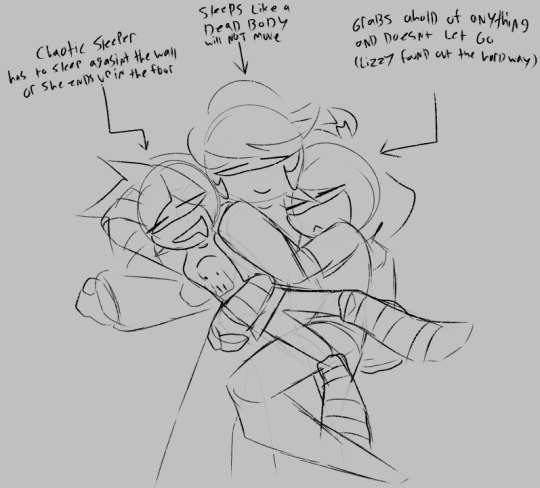


An Well Made Excuse To Post My Specific Headcanons I've Had Since The Show Came Out
#bro fought his way thru those two only to burn the house down#anyway kdsjfsdf#that doodle and that comic werent actually made for eachother#i just wanted an excuse to post my oddly specific sleep headcanon lol#I like to think Uzi is so restless because shes always thinkin abt smth (whether that be stressful or not)#N sleeps like a rock and usually doesn't move; if its just him and Uzi he'll usually curl around her so she can't fall off the bed#V's had the habit since she was a worker#Tessa would always make excuses to have sleepovers w/ her fave drones#and it was usually J's problem of being cuddled to death by a sleeping V#nowadays the only way V gets peaceful sleep is the reassurance that Uzi or N are still there#hence the N dog plush in the comic dsklfjsldkfj#I have more headcanons of this variety (like for J) but i'll stop here#thanks for reading again! you guys really like to point out my tags and it makes me giggle everytime#anyway BYE :]#murder drones#serial designation n#serial designation v#uzi doorman#envuzi#enzi#violentbiscuitbites#< i seriously love that shipname btw. I love MD ship names#i love having been here so long I could tell you who made the og names everyone built off of. I think fandom is good sometimes (sometimes)
425 notes
·
View notes
Text
My headcanon (heart-canon) that Mickey is Ian’s peace goes hand and hand with my headcanon that he is also Ian’s safe space.
Mickey is the safe space Ian needs when dealing with bipolar episodes.
As soon as Mickey found out that Ian was bipolar, he immediately took it as just another one of his responsibilities. It was a given to him that they would deal with it together. Fiona suggested having Ian committed, but Mickey was not having it. Yes, it would be tough to deal with, but Ian is not a burden to him, and they would work through the episodes together.

When Ian was manic, Mickey provided a safe environment for him have his episode. When Ian wanted to kill the homophobes, he helped rein in the “crazy” and provided an alternative. Instead of murder, just your regular old run of the mill blackmail would do. He didn’t try to stop Ian because he knew that wouldn’t be possible, but instead helped him through his episode in a manner that was less risky.

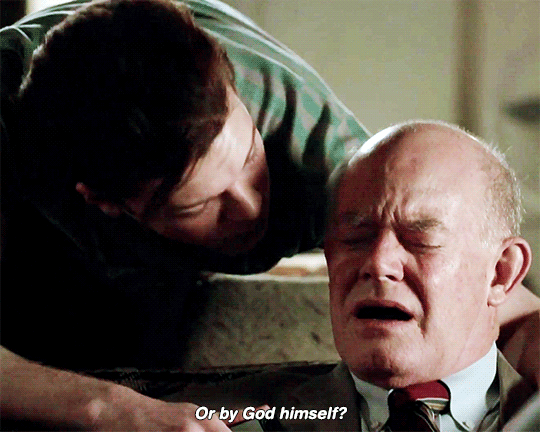
I just know that if he would have been around during Ian’s Gay Jesus era, Ian wouldn’t have ended up in prison. Mickey would have helped him accomplish his goals in a less destructive manner while he found a way to express his concerns over it being a manic episode.

Because, unlike others, Mickey’s first reaction is NOT to ask about meds, but instead to observe and see how he can help Ian through whatever he is going through. We see this when he observes that Ian is feeling down about losing his shitty warehouse job. He does ask about meds but only after spending the entire day together and giving Ian something else to focus on. Mickey knows that sometimes Ian needs him to be chaotic so Ian can get out of his own head and focus on whatever nonsense Mickey is doing.


However, Mickey knew when it was time to get outside help. The summer that they were living together he researched, and he was willing to ask Lip more about looking for outside help. When Ian did the porno Mickey was mad because of the cheating, but I also think he realized that he could no longer provide the safe space Ian needed. Ian went and did this extremely unsafe thing in a place where he, Mickey, couldn’t protect him.


Mickey allows Ian to have feelings and emotions. He doesn’t immediately label Ian’s joy and energy as mania or label his sadness and anger as a depressive episode. Mickey observers and tries to understand Ian. Just because Ian is bipolar doesn’t mean that he can’t have extreme emotions like any other person. It doesn’t mean that he can’t have an off days.

So Mickey Safe Space Milkovich, knows his husband and understand that sometimes he has to be a concerned husband and sometimes he has to be the shit-talking, bitch-slapping piece of south side trash Ian fell for.

Okay time to get off my soapbox 🤗
#sorry for the long post#really you don’t have to read this#if I didn’t write it it would eat my brain#my headcanons live in my heart so therefore heartcanons#Mickey is the agent of chaos that Ian needed#Mickey is his peace and safe space#thank you gif makers#I still don’t know how to make them 🙁#shameless#Gallavich#mickey milkovich#ian gallagher#mickey and ian
335 notes
·
View notes
Text
You wake up due to a an odd discomfort around your groin, you feel around and touch something soft and plastic?
You turn on the lights and find yourself lock in a small, pink chastity cage
You panic a little, you’ve never done this before, you try to pull it off and it won’t budge and you notice just how little you can touch your member now
You get hard
It hurts
You look around the room and see an envelope next to a small pile of clothes and some odd plastic?
You open the envelope
My dearest love,
You wronged me, the fact you wouldn’t know who I am makes it that much worse
So I thought it’d only be right if I punished you
As you might’ve found out already I’ve securely locked you up and only I have the key
If you ever want it back you’ll need to do some things for me first
Mod course you won’t be allowed to touch your memeber until I release you
Next you will need to wear the clothes, and insert the remote anal vibrator I provided to you
You will then need to watch any porngraphic content I send you over the course of the next 2 weeks, dressed up and wearing the plug
I’ve made a separate number where we can chat
I expect you to use the proper respect when talking to me
I expect you to thank me for teaching you how to be a good girl
And I expect you to drop whatever you’re doing whenever I send you a message, and if I so ask you’ll put on the shuttle clothes I gave you, put in the plug, and watch whatever degrading smut I sent you while I control your ass
Do this like a good girl for 2 weeks and I’ll take off the cage
Mess up once, and I’ll flush the key down the drain
Oh and don’t think to get it removed or anything, I got that onto you without you noticing once, and if you get it off I’ll know that means you’re ready for your second round!
And trust me you wouldn’t like the second round, something tells me that you’d hate losing your freedom of movement
So now be a good girl and dress yourself up already love~
I’m waiting
Oh! And one more thing!
I can and will change the rules at any time, for example one I thought of right now: the two weeks only count down if you spent the whole day in cute woman’s clothing, so if you ever put on those nasty clothes you’re wearing right now, the day doesn’t count and you still have 2 weeks to go
Good luck cutie! Try to keep me happy~
#I hope you won’t disappoint me#if you do end up taking off the cage it’ll be so sad#you won’t see the sun again for so long#but at least I’ll have my doll in my house#so it all has its up sides#so cutie do remember the choice is up to you for whether you keep it on or it gets removed#in all honesty I’d prefer it if I had a life-in-doll#.#force#forcefem#i-like-talking#..#big post time!#hope y’all enjoyed!#sorry that I haven’t been posting or responding as much lately#I’ve been *busy*#but still I’ve read all you’re messgages and they’ve all made me smile!#thank you all so much!#(you’re the reason I do this!)#(though sorry for still not thanking you one on one I need to get better at that)#(just know there’s a pretty good chance *you* are the reason I made this post!)#(so thanks! and I hope you had a great day! and will have another one!)#(goodnight cutie!)
299 notes
·
View notes
Note
In Regards To Your 2024 Summary:
Holy shit it’s been another year????? The hell?????
Also! Your art style is gorgeous and that being found in 2023 and then refined throughout late 2023 and the entirety of 2024 really shows, as does your growth in panel layouts, perspective, and — as you said — experimentation. If you ever post your animation or video game art I’m looking forward to it.
As cheesy as it sounds, being able to laugh at funny comics and look at all the details of your art really made my 2024 brighter, even when things were hard. Including looking at your older art— it doesn’t need to be new to be enjoyable! I’m glad your art is well loved and it’s a privilege to have been here since the (near) beginning. I hope you take care of yourself in 2025 and beyond!
You and your art bring a lot of people a lot of joy never forget that <3
Thank you so much for keeping up with my art journey throughout these last two years! Two years!!! I am baffled at how that feels both too long and too short!
Admittedly, my art summary didn't manage to capture the fact that I did a lot of comic layouts that I'm really proud of. I also drew more backgrounds and made some very detailed works (*Dungeon Meshi spoilers for these examples*).
The growth is lot more evident when comparing my 'best' comics of 2023 to 2024:


Sometimes the growth is vertical, sometimes it is horizontal - and damn, sometimes it goes out of sight into the Z-plane. But it is always happening!
#art summary#ask#The privilege is honestly mine; to be able to create comics and have had people rooting me on since the beginning really means a lot.#To everyone who the potential I couldn't and continues to stick around: Thank you so very much.#I cannot emphasize enough that I do see you. I do notice those who regularly like/reblog/comment.#I notice when people who haven't been around come back and mass like/reblog posts.#There are some people who have only *ever* liked my posts or have only ever lurked! I notice! I am so thankful!#At the risk of also sounding cheesy; I'm honestly happy to give back whatever I can to my audience.#Knowing I have brought people a little bit of joy to their day with my silly comics makes every long night worth it.#I probably make a longer post about it in the future; but last year when I made my first comic redraw-#-was the same day I got the news that someone very beloved to me passed away. I was in such deep grief I couldn't respond to comments.#But I still read them and I mean this earnestly; even though I was smiling through tears -#everyone's kind words truly helped make a pretty dark month a lot brighter. I probably would have crumbled without the support.#What really gets me is this: it was never directed at trying to cheer me up. It was just earnest kindness towards a stranger making comics.#If you've ever wondered 'hey does PD-MDZS know how much I appreciate their silly comics?'#know I have also sat here and thought 'Hey does this person know how much I appreciate seeing them in my notifications?'#Which also includes you! Mina BNHA you will always be associated with the cool person who's been rooting for me B*)#I wish everyone a wonderful new year; may all our creative endeavors be something we see as an exciting discovery.
193 notes
·
View notes
Text
regarding dr ratio's team join voiceline with aventurine
idk where it originated from but i've been seeing this notion that the ENG voiceline is horribly mistranslated and ratio is much more caring and friendly in the original CN. THIS IS LITERALLY NOT TRUE HE IS JUST AS BITCHY IN BOTH LANGUAGES
as a native chinese speaker i actually really love hsr's localisation and i would like to clarify the misconception + explain the cultural nuance/context behind this particular voiceline


i think this tweet might've been the original source for this misconception? op's translation of the CN line is very literal and completely lacking in cultural nuance. while the sentence 管好你自己 does literally translate to "take care of yourself", it lacks the automatic positive connotation that this sentence has in ENG. CN is a high context language -- aka the meaning of a sentence can be totally different based on context clues like tone, body language, etc.
ratio's tone in this line is not the tone of someone who is concerned for a friend. it's standoffish. when said in this kind of tone, the meaning of 管好你自己 is closer to "mind your own business", making the ENG "keep to yourself" a more accurate localisation.
in addition, the word 管 has connotations of controlling/managing something -- directly translating this to "take care of yourself" means it's missing a lot of important nuance.
granted, the second half of the line is a bit unnecessarily aggressive in ENG. the CN is more like "I have no need for your concern", and explicitly saying that he believes aven's concern to be "false" in ENG is definitely a lot ruder than the original line.
However. in my opinion it's not Too far off base. the way he emphasises the second half of that voiceline in CN carries an implication that he actually disdains aven's concern; we can extrapolate from context clues that he feels this way because aven's concern is just an act. tldr; eng line explicitly saying "false display" does make it ruder than CN but it didn't just come from nowhere -- the implication is already there in CN
this is not to say that ratio doesn't care about aven or see him as a friend. imo the reason ratio is so standoffish in this line is because any display of concern from aven here has the clear intention of teasing ratio. they both know ratio can take care of himself perfectly well. this is just how their dynamic works -- aven makes silly playful comments and ratio deflects them by acting cold.
in conclusion: ENG voiceline is not a mistranslation. hsr localisation is definitely not perfect but in this particular case i feel they've done a fairly good job of conveying the original meaning. thank you for coming to my ted talk
#SORRY FOR THE LONG ASS POST#Im just passionate about accurate localisation#if you read the whole thing thank you seriously#if anyone has other thoughts or questions please feel free to share under this post or in my inbox or wherever!#i did cross check all this with another native speaker but im open to hearing other ppl's interpretations too#dr ratio#aventurine#aventio#ratiorine#not necessarily ship but ill tag anyway#honkai star rail#hsr#long post
587 notes
·
View notes
Text
My biggest flex will always be how I knew Neil was the more feral and dangerous one than Andrew this whole time even before tsc and seeing the entire fandom freaked out makes me want to kiss and hug Nora and just thank her for finally finally showing everyone and I’m not just crazy
#seeing all the post about like omg Neil is so feral?! like brother did you not read aftg did y’all forget aftg is from Neil’s pov#ofc Neil wouldn’t say he’s feral in his own pov tf😭😭😭#and remember in aftg Neil still has to hide part of himself BECASUE his father and eveyrhhing but now he’s literally free from his biggest#fear and he could do whatever the fuck he wants#Istg the fandom is like the foxes man idk why everyone is so shook#literally cant thank Nora enough for showing everyone finally#Idc if I sound proud or whatever but I fucking knew it this entire time and I have been shouting it for so long like finally#that’s why so many fics annoyed me so much like#I just needed to say this because I finally felt seen and heard andFINALLY LIKE URGH#tsc and aftg supremacy#tsc#tsc spoilers#the sunshine court#the sunshine court spoilers#aftg#all for the game#tfc#the foxhole court#aftg series#aftg fandom#aftg incorrect quotes#neil josten#andrew minyard#andrew joseph minyard#neil abram josten#aftg neil#aftg thoughts#aftg textpost#aftg shitpost#incorrect tfc
714 notes
·
View notes
Text
venti lore stuff i like to think about a lot bc brainrot <3
he's good buds with morax and they play catch with mountains sometimes [teapot landforms descriptions]
he was made into an archon by andrius, who gave up the title because he saw how much venti loved humanity and saw that he'd do better than he would. i love this because he was never destined to be a god, just a wind wisp who wanted to do good
despite being the god of freedom, he is eternally bound to his role of being an archon and looking after his people and his nation
however, despite being an absent god at that, monstadt lives up to it's name of being the city of freedom thanks to him
some people who worship him thinks that drinking is bad yet their god is a drunkard and downs 37 bottles of wine on the reg
he terraformed the whole of mondstadt, reduced pilos' peak (the highest mountain in teyvat at the time) to musk reef (a small island in the ocean), led his people to new land to remake their city better, and then went to sleep for 1000 years???????? Honestly i get it
when he saw how self sufficient his people are, he entrusted the freedom of his own people to themselves because he never wanted to become a tyrant -- which is super interesting as this realization took morax and ei a while to acknowledge
he's allergic to cats and he hates cheese
he says he knows every song from the past, present, and even the future. he's either a branch of or IS the god of time, in this essay i will
barbatos's past was recorded in books and epics but he, as a bard, decided to write ballads about his own mischief which came off as blasphemous to his devoted nuns... so he got kicked out of his own cathedral
the moment he became a god, he used his power to liken his image to his late friend so he could live out the dream of said nameless bard and roam the land outside old mondstadt
that said, it makes me think that the last sight he ever saw of his nameless bard friend was him dying no wonder he needs a drink or two when he decided to gain a corporeal form
he forged a treaty that said the old aristocrats sold mondstadt to the geo archon and liyue, only for the people to realize years later that it was fake and was only made to prank morax and overthrow the aristocracy LMAOO
in one of mona's voicelines, she tried getting a reading on 'that bard who sits around all day' only for venti to send a strong gust of wind at her so she wouldn't find out he was the anemo archon
xiao's voiceline about him implies he could play the flute, which leads me to believe he could play any instrument he wanted his hands on
venti's hobbies voiceline: "i like to drink! and i like the wind! if only there's such a thing like wind-brewed cider"
guys i might like venti idk tho
#edit 2024: i still love venti but i forgot i had these in my drafts bc i upgraded to having a whole google doc for this thank you god bless#i love reading all of the crumbs i could get#genshin impact#venti#genshin#genshin venti#putting this out there and admitting that i am a venti enthusiast (like it's not obvious enough)#mute me#long post#text
172 notes
·
View notes
Text
I desperately need people to understand that Franziska's whipping thing really isn't solely a silly character gimmick. Of course it is to a degree, just like Godot and coffee and Klavier and air guitar in court, but so often I see people dismiss Franziska's whipping trait as an annoying feature that adds nothing to her character and I cannot stand it. This is a bit of a rant and I touch on gender inequality and the way I see a lot of men treat her as a character a decent amount within this because I feel like the fact that she is a woman is actually very important to this element of her character, and her treatment is also a lot of the reason why I feel compelled to talk about this in the first place.
Firstly what you need to understand is that not only is Franziska a woman, she is also laughably young when she becomes a prosecutor. She's a 13 year old girl trying to hold the attention of a courtroom of mostly grown men and be taken seriously. It's no secret that misogyny does exist in the Ace Attorney universe of course (see: Godot), but aside from this, maybe it's just because I've been playing Ace Attorney Investigations recently, but she is just very small all around. It's a running gag in Turnabout Reminiscence that she is short, she's small, she can't see things Edgeworth can - although granted Edgeworth is definitely fairly tall, most estimates I've seen linger around 5'8-5'10 (around 170-180cm). And of course, she is only 13 here, she's not done growing, but it's at this age that she actually did begin to prosecute. Naturally, she'd often be underestimated, and we can see a strong desire to prove herself during Turnabout Reminiscence, even just to her father; I can only imagine that this would extend further into her trials as a young girl. Secondly, she's the daughter of Manfred von Karma, whom she idolises to a godlike status and who teaches her everything she knows about prosecuting, and also a lot about life in general - he's her father. There's a lot I could say about their dynamic, but I feel that much of it doesn't need to be said in this specific post if you're already here dedicated to Franziska enough to bother reading this post.
Manfred's courtroom (and often, regular) behaviour revolves a lot around him taking complete control of the entire courtroom, with him even speaking over the judge, overruling objections he does not like and sustaining his own, and instructing witnesses himself. He also often snaps his fingers to direct attention to himself and his point. Franziska learns this, but how does a literal 13 year old girl follow her father in this regard? Well, by force. Whipping someone is a very clear way to get their attention. Not only the person it hits but the people around - whips cracking are loud, they take up a lot of visual space, and they also obviously cause harm to the person they hit. These are all things you can't really ignore - it forces you to look at her and pay attention to her and gives her control of the room exactly like Manfred. I've also been thinking a lot about the end of Justice For All in relation to this. She's lost to Phoenix multiple times and she couldn't beat him even once just to prove that she was better than Edgeworth as she so desperately wanted to. This brings me to another point about her use of her whip. While I think control is a huge aspect and is my main focus here, I think it falls more under the umbrella of Franziska's own perceived shortcomings. We also know that she doesn't believe she lives up to her father's genius, and that she consistently feels like she's walking in Edgeworth's shadow, she says it herself:


I think at least some part of the reason her whip is so important is because she believes she could very well be less than equal to others in the room in terms of certain traits. She sees her father as a genius, knows she isn't equal to him, and internalises this (whether she is actually less intelligent or not I personally don't know what I believe, I haven't played Justice For All in over a year and a half and I would have to replay it to decide my thoughts).

In having to be perfect, there are many expectations she cannot live up to, and this leads to many ways in which she falls short of what she believes she should be. By using her whip, again, she can account for her perceived shortcomings in other areas - control, her intelligence, her ability as a prosecutor. I think this last scene of JFA actually introduces us to the idea that Franziska is somewhat self-doubting in some ways and compares herself a lot with others, not just Manfred, but also Edgeworth, which we see more of in Ace Attorney Investigations during Turnabout Reminiscence, where we see her at 13 attempting to prove that she can "out-logic" Edgeworth for the entire case, and essentially, that she is "more perfect" than he is.
But to come back to her whip, control, and the end of Justice For All.

She is left with little of who she was before and doesn't know how to move on - everything she was taught to be from the moment she was born, she no longer is. She is 18 here, prosecuting for 5 years already and desperate to be prosecuting for even longer. As far as her life was set out, this was basically it for her - become a perfect prosecutor and prosecute perfectly just like Manfred - the ideal prosecutor in her eyes.



A Von Karma is perfect, but she is not - she lost, just like Edgeworth, whom she shamed for the same thing. She gives up her whip here, and I feel that it's truly symbolic of how she feels like she's completely lost control of herself, her life, her relationship with her father and most obviously her occupation as a prosecutor. How could she continue being a prosecutor when she no longer lives up to the idea of it that she's had her entire life? What use is her whip if she will not need to hold the court's attention any longer?
I'm sure a million other people have thrown their coin in the pot on this exact topic, and I'm sure many have said the same thing as me and many have said something different, but I needed to write my thoughts out about it because I couldn't stop thinking about her. This is one big reason why I feel like I see a lot of men who don't understand Franziska and see her as very annoying, gimmicky, and my least favourite - a "female Edgeworth." She is a woman who steals attention and space forcibly; both from characters in-game, and also from the player with her animations that take up time in trials and a lot of the visual space. Of course this makes her unpopular with a lot of men. I'm not saying that if you dislike her or the whip it comes from a place of misogyny, I am saying that I think her whipping trait is reduced to a stupid, annoying gimmick more than, say, Godot and his coffee, because a lot of people don't really care to see that there is intention behind it that reveals a lot about her character, just like how Godot's coffee problem is relevant to his backstory.
#if you read all of this thanks for being insane about franziska just like me#long post#franziska von karma#ace attorney#ace attorney justice for all#justice for all#ace attorney spoilers#aa2 spoilers#justice for all spoilers#val thinks#ace attorney investigations spoilers#aai spoilers#ace attorney investigations#aa2#franziska ace attorney#ace attorney franziska
676 notes
·
View notes
Text
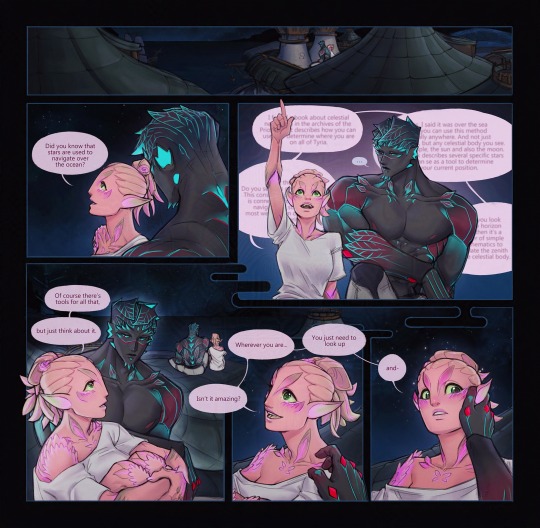

The Rooftop Date
The first time Mabaki reacted on instinct, not realizing that he may be developing feelings for Caira (lmao) (Full text of Caira's bubbles below)
Caira belongs to @floral-necromaniac
The text: "Did you know that stars are used to navigate over the ocean? Look there! Do you see this group of stars? This constellation in particular is connected to one of the navigational stars. The most well known of all them. The Polaris." "I found a book about celestial navigation in the archives of the Priory and it describes how you can use it to determine where you are on all of Tyria. Yes, I said it was over the sea but you can use this method literally anywhere. And not just with stars, but any celestial body you see. For example, the sun and also the moon." "The book describes several specific stars you can se as a tool to determine your current position. First you look at the horizon and then it’s a matter of simple mathematics to calculate the zenith of the celestial body. Of course there’s tools for all that, but just think about it. Isn't it amazing? Wherever you are... You just need to look up and-" Of course, Mabaki had been observant this entire time, taking in the moment to just sit still and listen to her ramble. And as her petals started to change color from excitement, he feels an urge inside him to lean in and kiss her. And he asks her to "Keep talking." And Caira looks away bashfully, "W-well, uh... I- ...." Mabaki never teases her about it and just pulls her into a side-hug.
~~~
Something that happened very early on in their timeline, as Caira here is depicted with her old hair.
Mabaki doesn't really like the talkative/rambling type, and Caira is exactly that, hah. He used to get annoyed with her when she kept rambling on and on when they first met. Well, at this point he's starting to get used to it and is actually enjoying listening to her and finds her... even cuter... So on instinct he just does this...
And no, their relationship isn't clearly defined at all in this stage, and it doesn't really happen for a while....
Oh Mbk... how much of a wife-guy you'll turn out to be.... LMAO
~~~
There's a few things I only started catching on in hindsight while making this piece. I did a basic plan for it, yes, but as I started to clean it, I added and changed some things as it went. Unfortunately, I ended up drawing the same face angle for Caira 5 times and it only really clicked with me once I started adding flats (talk about taking long to realize)
Next time I try something like this, I want to try and do different angles to make it more interesting... bah, unfortunate, but for next time!
And if only Mbk wasn't fighting me on that 1 face panel yeah man i redrew that shit 8 times i think he is so alkjsdfkljjskdjfslLKJSDF I HATE HIM i love him fuck you Mabaki LMAO
Also I'm hella shy about posting this but- but I still wanted to share. Surely in a few years time I'll look back and want to redo this... LOL
#gw2#guild wars 2#guildwars2#sylvari#mabaki#caira#cairadin#mabacai#its something simple and cliche in their uhh ship lore lmao#but its cute and cozy and its like hot cocoa you know? eh#WWWWWWWWWWWWAAAAAAHHHH DAMN IM ACTUALLY POSTING THIS#this took so long#just a sketch i said just a sketch i said#later on 'watch me shade it' goddamniiiit#worth it in the end maybe#i learned a lot and thats all that matters#my art#THANKS FOR READING ALL THIS WWWWAAAAAAAHHHHHH IM GONNA GO HIDE IN MY CAVE NOW SLKDJFLSDKFJDF#also frick you mbk for fighting me drawing that one face over and over cuz you have the cursed angle KJSDKFLJSDF#also gdi glaze why do you look like that ewww
175 notes
·
View notes
Text

This is the last time I'm going to be annoying about this, I swear.
A few examples of that I, a gifmaker, personally love seeing under the tags:
Analysis of said scene, show, or character, especially the long ones going in depth that span like 1000 words
People saying how crisp the GIFs look and how nice the coloring is THANK YOU. ILY GUYS. That's always huge praise for me.
Reacting with how emotional you got with the scene. How painful and emotional or how touching a scene is.
People making funny jokes, memes, comments, etc.
Literally ppl horny posting LMAO. It's super funny to read and I love seeing all the unhinged comments.
Seeing how much you loved the show and its characters
Things I don't like seeing under the tags. And these are just two very specific things:
How much you hate the show, how much you think a scene is bad, how much you hate a character, the ship, the creators, etc. or how much you dont like this ship anymore, calling a ship horrible because ____ reasons. OKAY! I get it! But I don't want to see that. Make your own hate post on your own blog! You're free to have an opinion on how much you hate something. Just do it on your own blog.
Asking why I leave out certain scenes out, why I decided to gif this scene, or not gif more of these characters. Sometimes, I'm just exhausted. I can overlook things. You guys don't know how draining making gifs can get to me, especially the scenes that are really long. But I do it because I LOVE Arcane, the story, and the characters, and the particular scenes that I make gifs of. I have my own biases too. Of course I’m making them first. Please, just make them yourself instead of complaining under the tags of my edits. Yes, I can see them.
Don’t get me wrong, I wholeheartedly appreciate everyone who supports and follows the blog. I want to make a million more HQ gifs of this amazing show, but sometimes, the very rare negativity can still get overwhelming, to the point where it demotivates you.
Arcane is extremely special to me because it's such a fantastic show, and that alone motivates me in trying to create more GIFs. Honestly, if it was any other fandom or show? I would've probably left already. Arcane is THAT great.
I know the block button is there. I use it too, but sometimes, the amount of effort and time you exert to create FOR FREE just isn’t worth it. And that’s why gifmakers and creators stop making things for fandom. It’s not fun anymore. It’s not worth it.
Some people think that making my style of GIFs is easy. Then great! Since you think so, then do it yourself and help create for the fandom too! I wholeheartedly encourage you to do it!
TLDR: Don't be rude on people's fanwork, especially when they are created FOR FREE. If you don’t like their fanwork, you can make them yourself.
#personal tag#long post#ok i will shut up about this topic but i really really needed to get it out#this is the very last complaint post you’ll see about this fr just let me fully rant abt it just this once#to the people who listened to my grievances thank you too you guys know who you are#and if ur here thank u for reading this#ive pumped out what.... 20 gif sets in three days........ and posting a lot will defo get some irritating comments#i know i cant control them but sometimes u accidentally see some and it just affects you#theres a reason why my inbox comments and mentions are closed and sometimes its because some people can be fucking insufferable#janna give me strength in the next few weeks#and if u see me randomly disappear and stop creating then u know why#but for now my love for the show transcends all of this and im going to try my best to avoid seeing annoying comments on my edits#idk if other gifmakers get it but like..... yeah i hope i can have thicker skin#ive rested and recovered from being tired and demotivated but the whiplash you get at the heat of the moment is insane sometimes lol
152 notes
·
View notes
Text
totk rewrite- botw2 edition
been thinking about the other totk rewrite again (the one only based on botw in which the sonau stay a mystery while being expanded upon)
i talked about it before but heres a lil breakdown (im reusing alot of mechanics from the villain rauru rewrite bc they work too well to be discarded for this one)-
(edit, about five hours later .. its not a little breakdown, its a pretty complete summarized breakdown of the entire new rewrite that i didnt intend to spend the last hours of my sunday on but here we are .. long post, but with pics bc theres lots of concepts im reusing or reviving)
okay START:
zelda and link explore the caverns below hyrule castle bc the shiekah tech has been losing power and their research as to why lead them here
they discover ganondorf and through zeldas curiosity break the, already weak, seal on him (no enigma stone here, the seal was done by an ancient queen of hyrule)- he wakes up attacks them, breaks the mastersword and miasmas/malices links arm off (also idea is that you have to fight him but meant to lose horribly lol) and then have to play an escape sequence (or watch a cutscene of it) in which zelda drags link after herself running from gan
(remember this old first idea drawing i made when i started to think about a rewrite? yeah im reviving that, except theres no totk sonau in this anywhere)
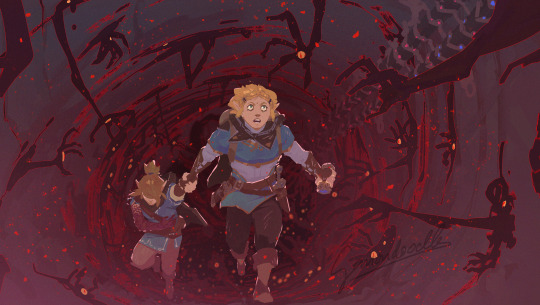
they get out and immediately afterwards a heavy earthquake runs through the land, completely, and actually, changing the map (also using the idea of devastating the regions climates- gerudo desert is flooded, death mountain collapsed inwards, the zoras realm is dried up, rito village has completely frozen over - ACTUALLY frozen over, everything encased in thick ice, the temperature has a special new low point, the winds too strong to glide anywhere-, mountains and rivers shifted, caves are revealed- oh and most of the main villages have tried to flee somewhere saver so theres no literal 1 to 1 repeat of points of interest from botw; also no uh .. miasmas holes that are literally jsut like drilled out bc what?? i want the access to the underground be few and hidden to make it more special to discover)
links arm gets amputated and replaced with a shiekah tech one (maybe using the botw shiekah stone/slate since they still dont know how to make them and its the best self sufficient piece of tech left that doesnt rely on the breaking fuel structure) (reusing this concept from the villain rauru one, with the difference beign that theres no corruption of link -or maybe it does have an effect to have shiekah tech literally hooked up to yourself *thinking emoji*- the abilities remainign the same)

when link wakes up some time has passed (so its more logical that the other regions have tried to cope with everything happening) you get a tutorial by purah and other shiekah (bc with zelda in charge theres more shiekah doing tech stuff again! cool!) and now have a magic meter (functions like in the previous pic, recharges over time depending on environment! bc i find that idea so cool for interstign puzzles and storytelling- like i said in an older post, a place where lots of people died might be richer in spirit energy recharging your magic faster- others have been hollowed out of luminous stone which slows down the recharge) and you are left to decide where to go
both zelda and you have a shiekah stone/slate replica but its incomplete since as mentioned the knowledge on how to make it is still lost so it only has the basic functions, such as the map, journal, camera and teleport
zelda is your companion from the start, in the years since botw she trained in basic self defense and can use her sealing powers as a shield to protect herself (though reluctantly since she doesnt want to rely on them) so you dont need to babysit her- you can tell her to be aggressive in encounters, supporting you (occasionally shields you or heals you a little?) or stay out of it/only self defend if an enemy targets her (in case you dont want any help) - she also copies your movement in a way, when you glide around she will too etc- in cases where you go very fast to one thing, like the hookshot, she will grab onto you
zelda also acts as your mobile crafting station, to put it bluntly, as she can craft and repair weapons, which is at first limited but can be expanded upon by doing quests (like the options of spear crafting being hugely expanded by a zora quest- fitting their fight style), when she does it you need the material needed for it though it costs no money- theres new little smith shops around the world that can repair and craft as well in which you can spend money instead for material you are lacking (and a little fee for the work you know)
(one of the first rough concepts for a pair of smiths, one is at the shop (green lady, the scars on her arms are her missing fins bc she burned them or lost them in battle), the other walks around it like terry (beedle) does and from whom you can buy already crafted simple things, like arrow types-
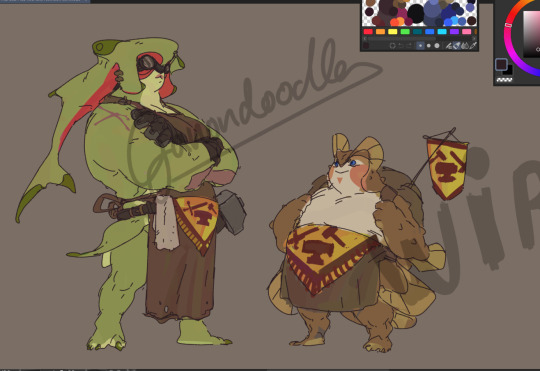
oh yeah, arrow types return and get more options bc theres no way in hell id make anyone scroll through that awful menu just to fuse one arrow at a time (the old types return, but theres new ones and all are craftable in bulk, here and old rough sketch)
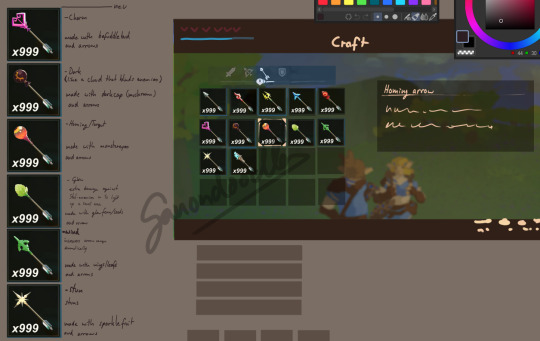
(also theres no new 'in the same location jsut a few steps to the left' towers that shoot you into the air bc it just destroys the entire world design- even if there is no sonau tech in this one so no gliders- i want the sky to feel as dangerous and mystical as the underground)
the sky has to be reached via the hookshot, its got big islands mostly with old shiekah ruins, including that broken titan prototype i drew before, and the bird mechanic (you can tame birds and register them at a location there, idk if im keeping the idea of a lone shiekah there, but the birds will stay)-which is if you tamed a bird you can call it when gliding to gain a little boost in height, enabling you to reach islands further away (since no building, yeah that mechanic is better used in a game actually built around it, which totk just isnt- do not argue with me about that- to really let it shine instead of just being a tiktok viral funney build simulator that adds nothing meaningful to the game and actively makes it worse due to its implementation just not fitting there) or save you from falling if you barely missed the edge of one - theres few points of teleportation up there so the world map isnt made skippable, theres no shrines there (and in general, there are no shrines, just minidungeons- ACTUAL minidungeons- integrated into the world, like really big caves that are each unique and filled with challenges- and much fewer of them) (the islands being mostly made nigh invisible from the surface bc clouds gather on their underside)
perhaps different glider types?! and you can switch their design via zelda too
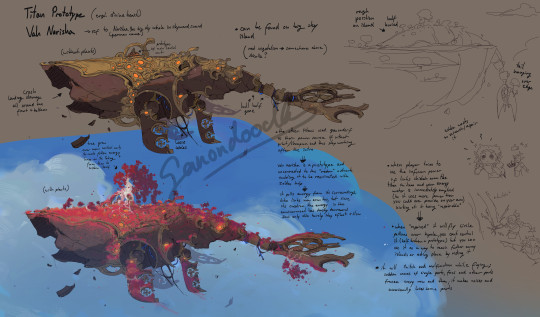
the old botw shrines are non fucntional due to loss of power, either overgrown or broken into pieces due to the ground breaking open, some might be infested with malice/miasma and comes alive like a weird mix between guardian and miasma crab (which also goes for guardian wrecks that hadnt been taken apart for research yet), some are fallen into caves that got revealed or got swallowed by the ground with only the tip remaining- the titans (divine beasts) are all repurposed (like in the other rewrite ideas i had)- the rito tried to flee the blizzard using medoh but sicne no one has piloted it and unstable connection to them causes them to crash in the hebra mountains, unable to leave it due to the storm and thus on limited time; vah rudania was perhaps made into a temple, or training ground but fell into the underground when death mountain collapsed (imagine ... malice/miasma infested rudania being an actual boss itself, chasing after you in the underground); vah ruta was absolutely made into a place of worship and after their domain dried out a few remained there praying to it convinced their faith would save them- its not able to move but manages to produce a little water still; vah naboris might have been used as a stronghold/lookout but due to the desert flooding (which is in fact, bad) its one of the 'islands' people now reside in
new weather types, including storm and darkness caused by mushroom spores that are invasife to the surface
theres at least six dungeons, one for each region (but not in the exact place as in botw bc that is literally just plain stupid though i might use the zora sewer/water system idea for an actual dungeon instead of .. a single button- bc how cool would that have been?? no no lets put the fish people in the sky and put a single button in the coolest part of it that only activates a waterfalll .... coming out of a tiny island in the sky- all just by of the visual neatness of swimming up??- anyway) plus a yiga one that is in and below the akalla citadel- also might put hyrule castle into the underground and inaccessible for a good portion of the game- and one in the forest of the krogs that was corrupted (which i thought was the reaso nfor the backpack krogs, but no, they literally have no goal and serve no purpose than to make funney videos with em, and then even the forest is nothing more but a reused lame fight agaisnt phantom gan- im starting to rant, sorry)
the abilties of the champions will be similar but there are changes, as in tulins (who i might just change to teba bc lets be real he was the one you interacted with in botw really..) isnt a gust of wind, since its both contrary to revalis whole deal of how difficult it was for him to create the updraft and then tulin can just do an almost exactly the same thing as like, a 12 year old- also its little usefullness after me adding in the birds for the sky and different glider types- maybe ill make it a strong windcut forward like in the other rewrite, like the yiga officer windattack but on steriods id also consider most of them not having the innate ability for it anyway, except for yuno maybe since he literally inherited daruks shield and as my idea was could make a variation of it adding the roll an fire to it but still having the shield, bc it kinda makes them like a boring copy of the botw champions and also lessens both their impact in a way (perhaps bringing dungeon items back?? idk,so still working on that)
each dungeon has a unique boss, at least on of which being a corrupted friend (PROPERLY DONE not like poor yuno in totk >:I ) bc each being just some monster tm is kinda boring (like twilight princess was so cool for how it mixed its bosses tbh)- also want satori to have a dark (also nice) counterpart that you might have to fight first bc you are trespassing into its domain (an old sketch gonna revisit it at some point)

new armor sets of course, and you still own YOUR house in hateno, zelda either has her own one in the spot where landa (the funky building lad that you bought your house from in botw) had the 'example' houses or yours got an additional building added onto it for zelda (and you can customize like, trees around it and have a lil farm spot too!!) and in your house theres a chest you can store armor sets in so you dont have to sell them to avoid inventory clutter
POUCHES return!! you can find some but most are locked behind quests (since logically people likely would have pouches) making them a really good reward and dont force you to engange with krogs if you are tired of them, it also avoids making you go back to them over and over just to expand inventory (you can choose for which part you want to use the pouch for, weapon or shield slot etc)- krog seeds are now its own currency for a lil shop you unlock in the forest, one of the highest rewards being the eponator zero (the motorcycle from botw)
also BOTTLES return! the main way to store healing, which also has to be consumed in real time (like in skyward sword, select in on a wheel so link takes it in his hands and 'a' to use it) avoiding the pause and spam apples into your mouth problem-
now cooking is NOT removed, it has even better effects than potions BUT it cant be stored and has to be consumed where you cook it (hear me out-); the cookbook in totk i find pretty annoyingly useless so, the cookbook is now a proper book you can fill out and when you want to cook a recipe you select it there and cook it with what you have (it shows if you dont have it all and also if you wanna swap an ingredient that would end with a similar effect) AND since you cant store it, theres special NPCs that reappear throughout hyrule (like a group of chefs that have one in each region at least) that let you just cook whatever you want without it wasting your materials, and if you hit a recipe it unlocks and is saved in your cookbook (you have to have the materials you want to cook with but it wont consume them, so you cant jsut spam it and fill the entire book out in one go- maybe the chef can give you subtle hints with expressions if something might be good or not before you try it out so you dont waste ages just cooking the same shit over and over xD)
(also possible idea for an item or big quest reward, a portable pot you can set up to cook with -with wood and fire- on the go without having to rely on finding them in the wild, and zelda can act as you chef giving you hints ... honestly i love this idea, remember all the cute botw art of them travelling and cooking together?? make that real you idiots!)
to upgrade your health or stamina you have to get spirit orbs still, but this time you get big ones that each can be traded, since thers fewer minidungeons but they are 4 times bigger than shrines they also give you 4 times the reward- but still one where you can choose which one you want bc i find that an important bit of freedom (idea still is that you free trapped souls and they give you the orb as a reward, majority of which are in caves in the underground or in the surface caves) which encourages you to vary your gameplay and not focus just on one area bc you probably want all those things, go for quests for puches and bottles, for minidungeons for health/stamina etc
oh yeah, the underground houses several dungeons, the weird gravity effect is in either the entire underground or in parts of it- it does not span the entirety of the map, isntead its smaller and often enclosed areas that each are more detailed and 'finished', theres different bioms and enemies you dont find anywhere else, and some enemies on the surface (like the miasma hands but like .. less easy and no phantom ganon bc that got boring rly fast) that sport those hands can grab you and drag you underground- which can either mean doom for you or .. discovering a new area down there hmmmm a risk to take isnt it :3 (also wanted there to be a mount there but idk if i will use this old concept of the dongos or if i want it to be a crab like thing bc of the underwater theme i want to go for)

LORE/STORY
so as you explore you may discover caves and areas in the underground containing sonau architecture (the type from botw, not totk) most of which heavily damaged, but theres few that are in 'better' shape bc they have been in selaed off caverns that werent yet discovered-
you find out the sonau, which you only vaguely knew from ruins in the overworld, were in fact real (but no you dont suddendly know they fucked with hylians and even their names of untold thosuands of years ago that you just so happen to have read in a book all of the sudden like it was an always known fact and not at all a myste- .. rant alarm .. ), and given the ruins underground they must have originated from there, but there are no scriptures that survived and all sculptures are in very bad shape, alot of which seems intentionally destroyed- slowly you and zelda piece together through vague clues (VAGUE game VAGUE, let people THINK) that they had knowledge of the past and the nature of the ever repeating return of disaster to hyrule; the biggest reveal beign that they knew the cycle wasnt natural at all and that it keeps being repeated only through the structure of how this land operates, the beliefs of the people that rule it, altered history etc.
the ancient shiekah under the rule of hyrules royalty found out what the sonau had discovered/knew and persecuted them (parelells to what the king would do to them later on, anyone??) since the divinity of the kingdom must be upheld by all means necessary- which is why the sonau had disappeared so entirely, with little of their culture left and none of them, and by doing so the ancient shiekah also discovered the previously lost knowledge of the gerudo king having turned into the biggest threat to the kingdom in the past (which the sonau had kept secret, knowing what consequences it could have if not handled carefully), which starts up a whole other betrayal plot of the kingdom planning to imprison gan before he can become a true threat (im gonna guess the relations between the gerudo and hyrule havent been that great even before since hyrule was still the main empire)
gan finds out before the plan goes through and assasinates the king of hyrule, the ancient queen declares war (yes, the queen for once) and in the end sacrifices herself to seal him away, more for revenge than any prophecy, but it nevertheless leads to the cycle doing its thing yet again
calamity ganon is a product of ganondorf trying to break free of his seal- and perhaps in an attempt to weaken his unbreakable will the shiekah discover they can use his spirit as a powerful source to their newly invented tech- which previously ran with processed luminous stones (yes battery theory will never let me go idc) and essentially use his own power against him by beating the calamity with their tech
(this knowledge is also how you get the yiga to work with you, using your knowledge of the past as leverage and zeldas ability to negotiate - and bc i thinks it would be cool to see her develop that way, and no i dont mean it as they all gonan fix it uwu either, its hard to go into more nuance here, its already way longer than i wanted- and yes this also ties into the koga is one of the ancient monks that made himself basically immortal through malice experiments HC of mine)
he attacks the regions bc they too sided with hyrule, he drags you to the underground bc its where he has spent thousands of years in agony, hes only out for revenge, an understable one and one you can sympathize with, but one you cannot negotiate with, its been too long, too much, no amount of apology could sate the desire for payback (which keeps the whole link and zelda defeat ganon formular alive BUT gives it nuance, right?? more tragic really, i hope that comes across)
he attacks link and zelda, breaks the masterword bc he has seen it all before, the original calamity, through the eyes of malice, he knows what you will do, inevitably so, you too will come for him, again
at the midpoint of the game you will reach hyrule castle (underground? perhaps it depends on how much health you have, getting grabbed and dragged into its depths losing hearts and if you have enough you survive until you are inside the castle and let go, you cant teleport outside - oh and zelda is either absent for the fight bc you got separated or she held onto you and protected herself with her power- honeslty kinda like the seperation idea bc after having her around all the time its gotta be super creepy to be suddendly alone) and will have a fight with him, that you kinda lose but are saved by the rest of the crew that zelda had banded together and brought here after being seperated from you- maybe without koga yet bc he would be locked to late game i think
there will be a quest to reforge the mastersword, which if you havent already gone to the forest will now lead you there (oh also some of the krogs you find outside the forest now will tell you that they had to flee, but maybe warn you not to go there yet if you are still in early game, others might not know bc they left to plant new forests, windwaker style, maybe a quest there too! to give them purpose beyond being your plaything and then just disappearing- ahem .. )
(old concept for the krog forest/dekutree boss)
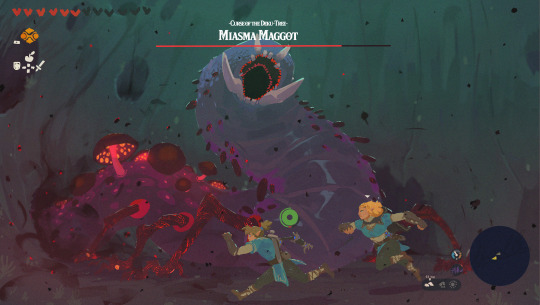
the dekutree will tell you to restore it it will need the blessings of the three dragons (who might not have appeared yet, or slowly disappeared one by one, they might need to be rescued bc gan probably knows you are gonna try and repair the sword) (oh look more old concepts still relevant!)

in the end it will .. end with you defeating ganon, just like always (unsure of the place where it will will be but OH LOOK old concepts- here it was still with hyrule castle in mind but that might be jsut for the midpoint fight now- maybe id put the end fight on the forgotten plateau, to round it up nicely, ending where botw began ... ;3
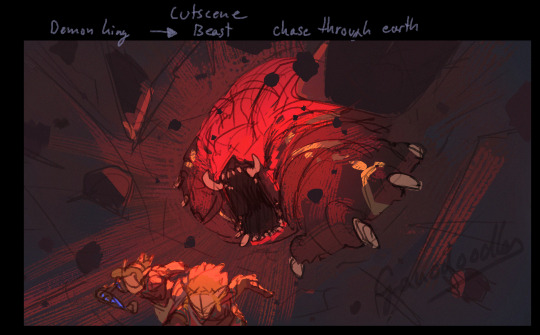
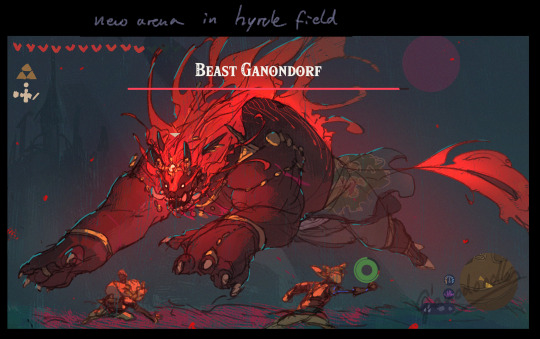
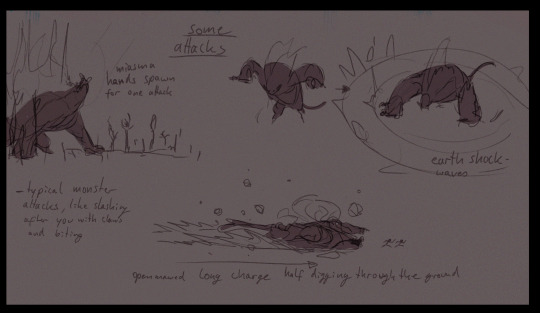
i really like this one .. even more than the villain rauru one, though that one is fun bc a twist like that is pretty neat and fighting with ganondorf is also rly cool- but sicne i just dont like the totk sonau and much prefer them remaining mostly a mystery im very fond of this (also .. im so sick of ancient people with high tech bs now..)
the aim with this is to .. make a botw2 that actually feels like a botw 2 (for me), shiekah tech is still there but little functions still, logically bc its main powersource is breaking off of it, the sonau are a mystery and kinda negatively talked about bc the shiekah persecuted them just like they would later be - also explains why there are shiekah things in every sonau building, of course they would overtake their places and try to erase a much as possible of them (the thunder plateau might have been a place of worship to farodra or for research- now look its a puzzle for a shrine to strengthen our hero to defeat the thing we caused :)) ), the sonau are expanded upon WITHOUT destroying their mystery (none of them are shown, there are NO memories in this game, everything happens in real time and what you can learn about the past is mostly vague clues pieced together by nerd zelda!)
it gives more depth to the shiekah as well as add an important ounce of nuance to the yiga and shiekah, to ganondorf as well while adressing and fixing the things that needed work in botw in ways i would find enjoyable (instead of making it WORSE)
i also dont want to go too hard on 'zelda is totally agaisnt the monarchy bc monarchy BAD', its not meant to come across like that, i just wanted to do sth interesting that does question everything and bc i like to think she could be lead to a different way of thinking, especially if so through her own research and discovery of previously buried history, being confronted with her own biased views by her passion for her interests
anyway, if you read through all of this, i probably forgot stuff, buts its very late and i spent alot of time writing this (bc i cant stop once i started i guess) and theres lots of things repeated that i already talked about BUT if yo actually read through it all, i cannot even begon to express just how much that means to me, and id i dare request, do tell if you like it!!! and thank you so much!!! it might not seem like much but this is also very important to me, i still dream of gamedev after all and i see this as a sort of practice, are my mechanics and stuff actually better os does it just seem like it to me etc -
(though keep in mind, this is in part self indulfent bc hey, its not real and is never gonna be so i might just do what i want- and yes i do believe it is doable, even if this all sounds alot, the magic lies in making it less but make that 'less' more dense and detailed, hence the underground being like at least cut in half in size and the building mechanic being removed (to give to a game where its better used than totk) alone should free alot of time and space for the things i described here)
-thanks again for reading, posts like these rarely get much attention so uh ... its pretty much never worth the time i spent typing designing and writing it (even if theres still lots missing here, like the dungeons and details to the champions ..) so every bit of commentary weighs alot more <3
#ganondoodles talks#ganondoodles#zelda#ganondoodles rewrites totk#botw2#loz#legend of zelda#tagging it as totk even if it might endanger it#totk#the legend of zelda#long post#but worht it! .. i hope#i think im best at the whole mechanical aspect thant the story#bc im a lil whimp and have trouble writing serious flaws etc#at least i feel like thats me#anyway- i cant look at the screen anymore i need a break#and if you read through it all and like it!#i wish i could thank you like you deserve ;_;#bc who reads through this mess really#gotta have nerves of steel- my respect
392 notes
·
View notes